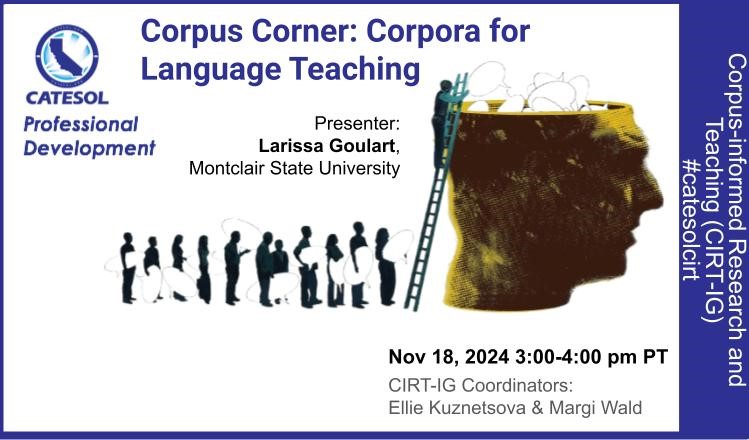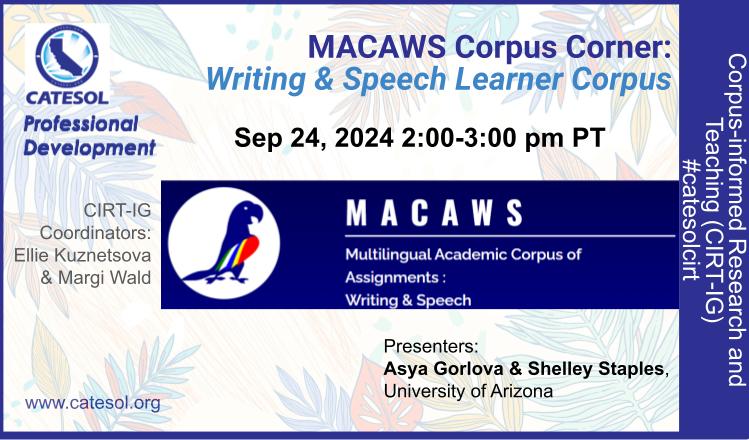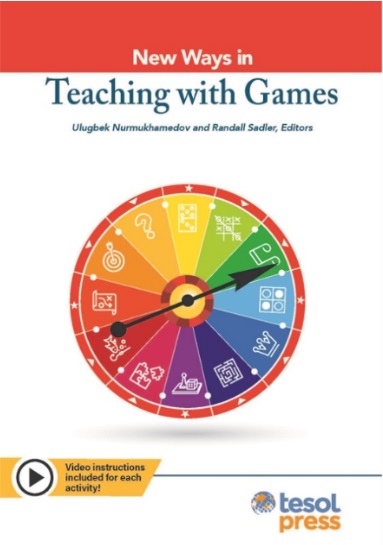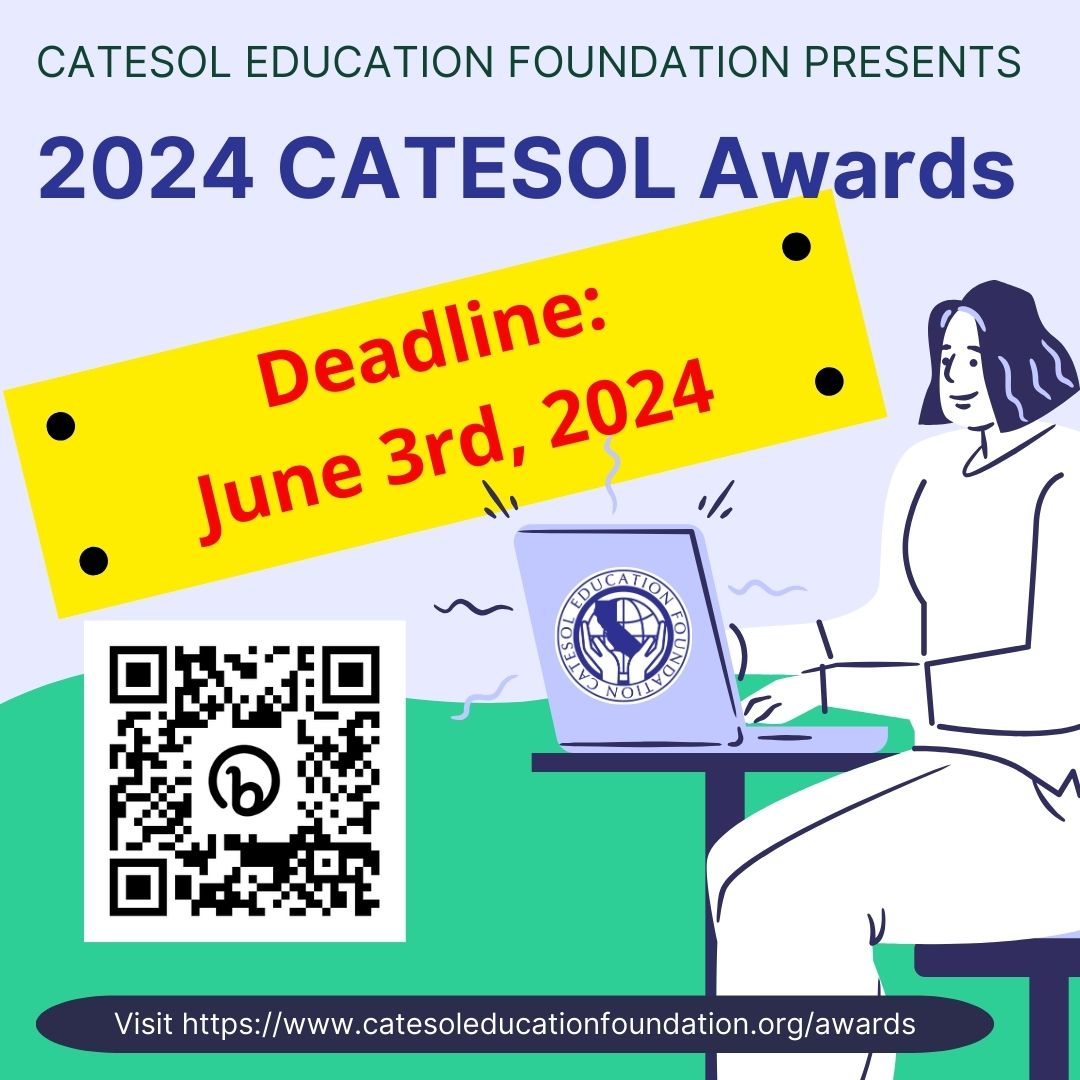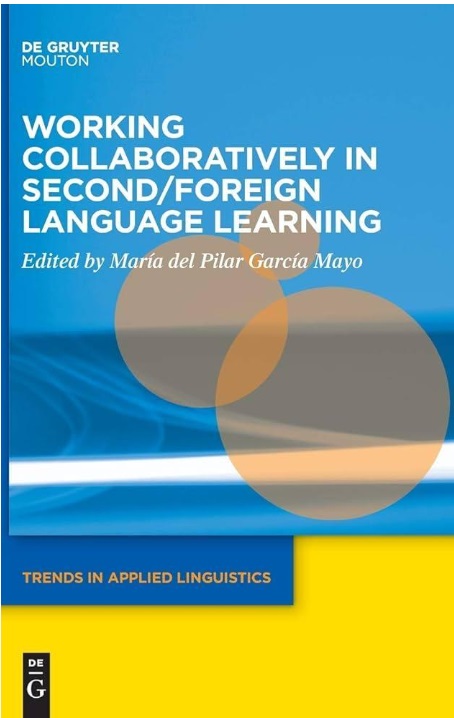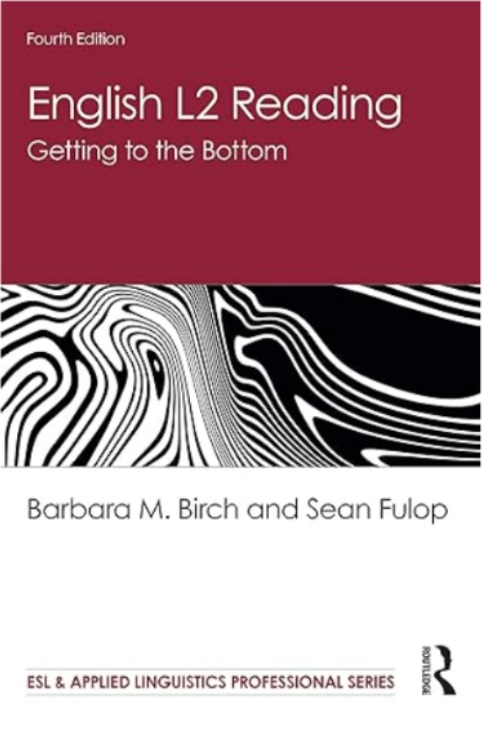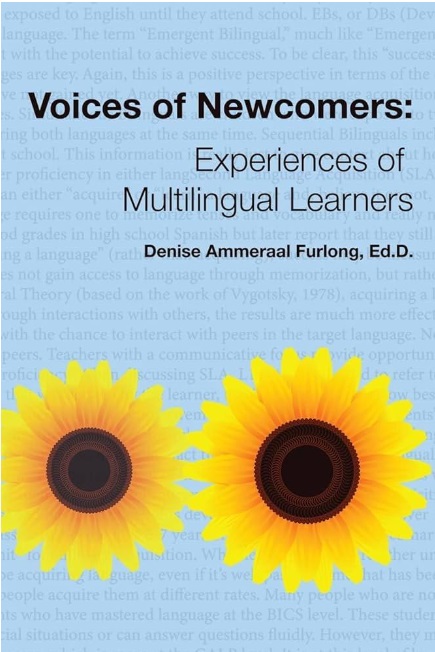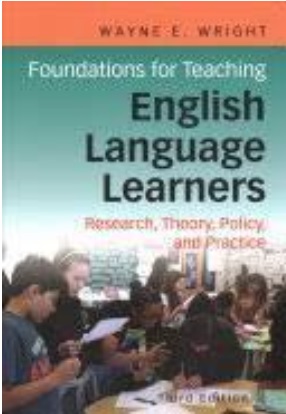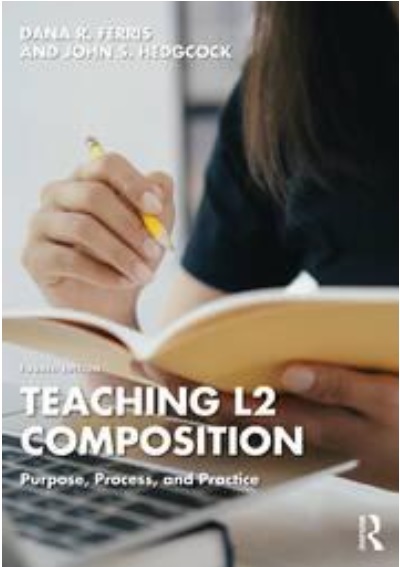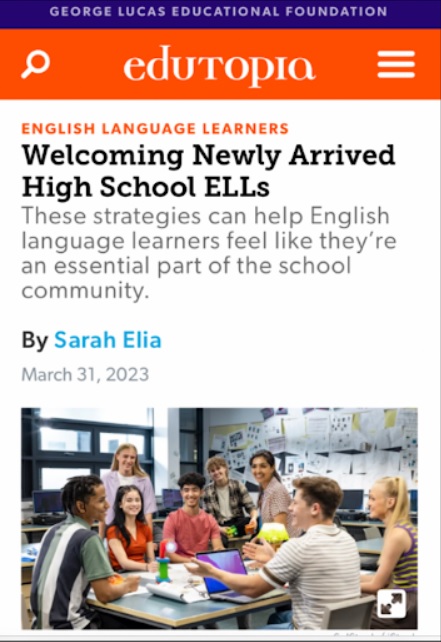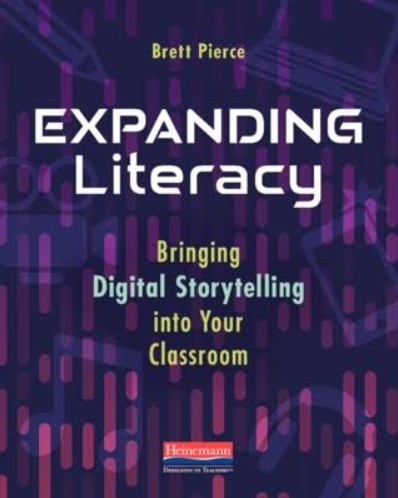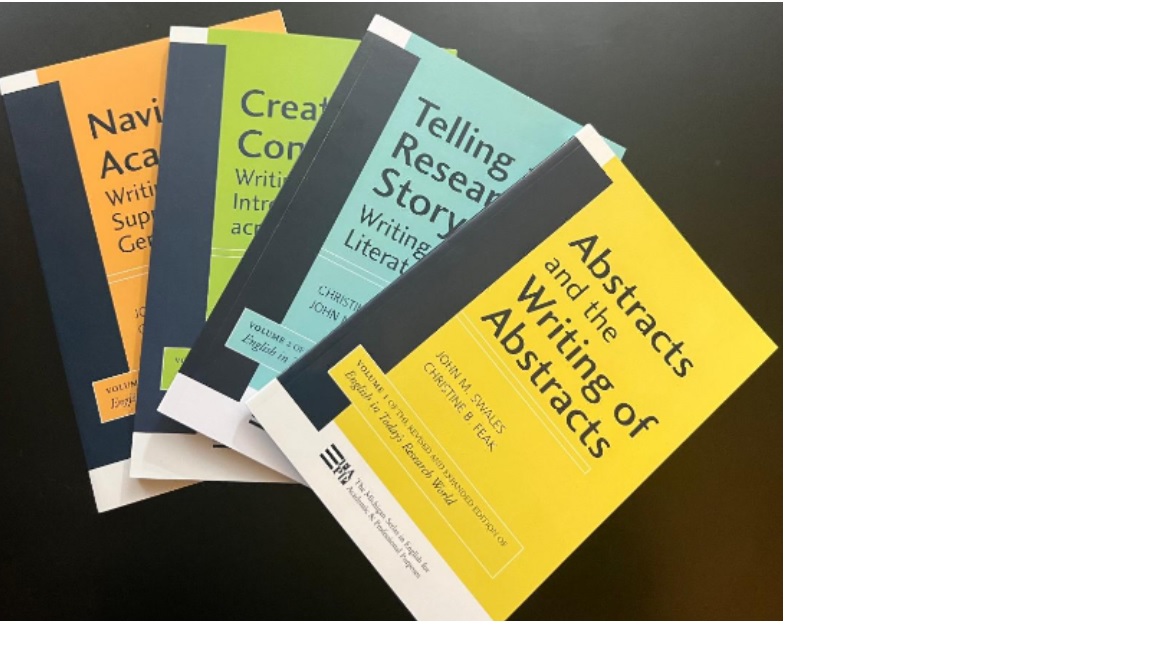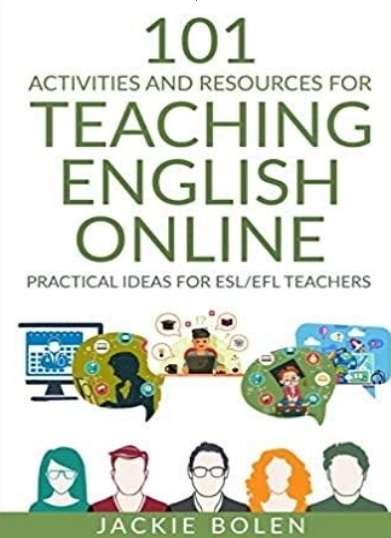Welcome to the CATESOL Blog! For inquiries and submissions, send email to: blog@catesol.org
ChatGPT For ESL Teachers: 50 AI-Powered Strategies to Create Lessons, Activities, and Assessments Faster by Anna Foster
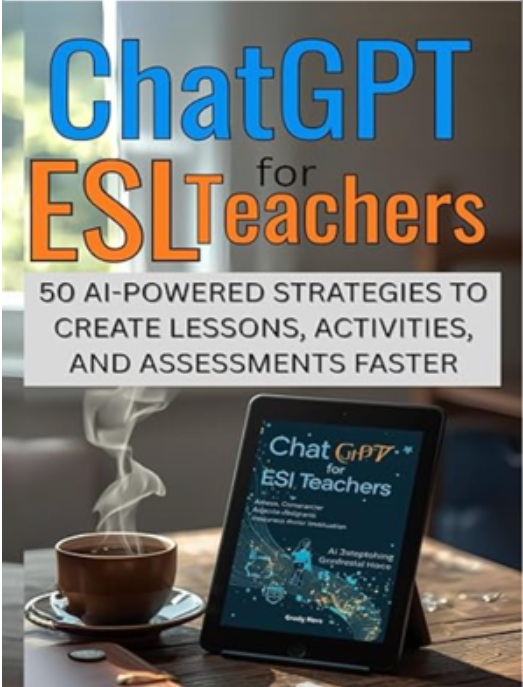
Ragaa Shenouda, EdD
Introductory Overview
ChatGPT for ESL Teachers: 50 AI-Powered Strategies to Create Lessons, Activities, and Assessments Faster by Anna Foster is a practical and teacher-friendly guide designed to help ESL educators use artificial intelligence effectively and confidently in their classrooms. The book presents 50 easy-to-implement strategies that demonstrate how ChatGPT can support lesson planning, classroom activities, and assessment design while saving time and increasing student engagement. Grounded in real classroom needs, the book empowers teachers to integrate AI as a supportive instructional tool without compromising sound pedagogy or professional judgment.
Algospeak: How Social Media Is Transforming the Future of Language by Adam Aleksic
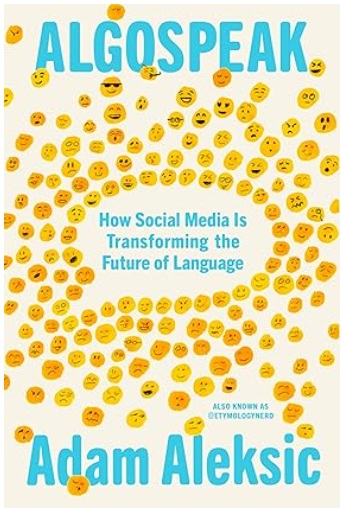
By Federico Pomarici and Kara Mac Donald
Introduction: Why Your Kids Are Saying “Unalive”
The first paragraph pulls in the reader who is not a Millennial (i.e., Gen X or Boomer), or even a Gen Z, with an account of a tribute to the music band, Nirvana, at a Seattle museum with a tribute to the death of the lead singer and guitarist, Kurt Cobain. The account presents signage using "unalive." From this anecdote, Aleksic explains that words like “unalive” have emerged not because young people are trying to be vague or humorous, but because social media algorithms actively shape how we all speak. Online platforms flag, hide, suppress or demonetize content and generate euphemisms that avoid detection. These terms are created by users to adapt to flagged or blocked content. Once these substitutes circulate widely, they become normalized within online communities—sometimes even migrating into offline speech. The intention is to inhibit terms and discussion of violence, self-harm, and other topics among youth, etc. The lexical and phrasal workarounds migrate from online spaces into everyday speech. “Unalive” is an example of how algorithmic moderation influences language change.
The Culturally Inclusive Educator: Preparing for a Multicultural World by D. R. Samuels
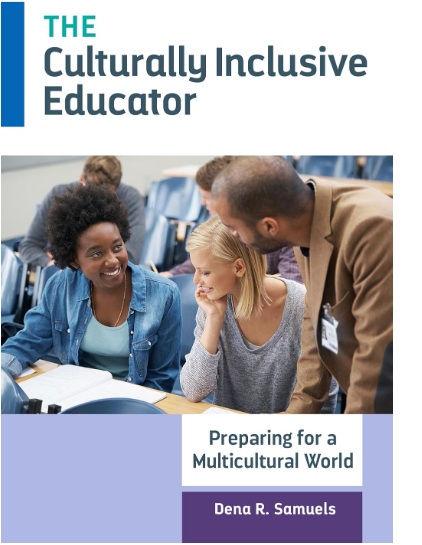
By Bushra Wilkins
Introductory Overview
In The Culturally Inclusive Educator, Dena Samuels addresses the pressing need for educators to become more comfortable with the diversity of their students, especially in today’s increasingly multicultural educational environments. Samuels presents practical strategies that help educators reflect on their own biases, build culturally responsive teaching practices, and foster inclusive classroom settings where all students can thrive. This review examines the book’s core themes, including the importance of self-reflection, cultural awareness, and classroom strategies to promote diversity and inclusion.
Exploring NNEST Lived Experience through Narrative Inquiry
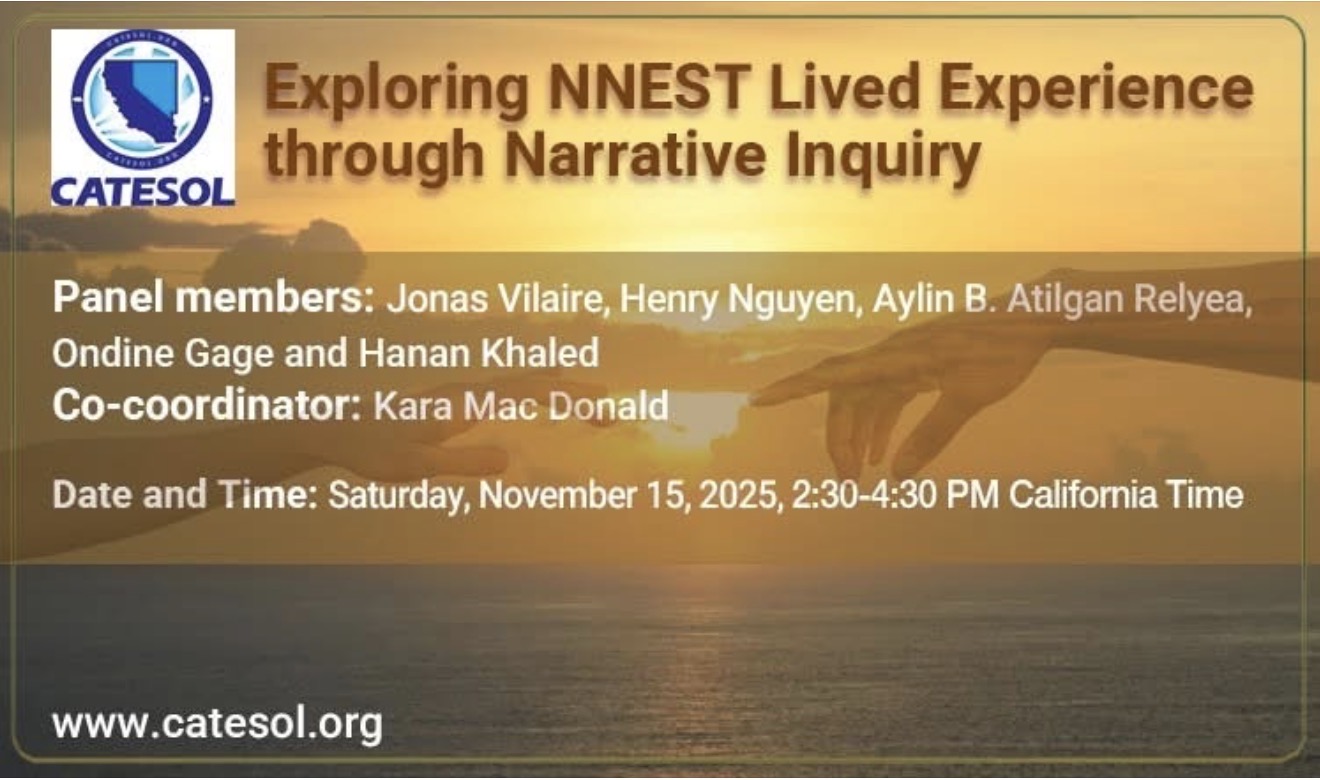
Description
Non-Native English-Speaking Teachers (NNESTs) often face challenges related to linguistic legitimacy, professional identity, and hiring biases, often being compared against native-speaker norms. However, NNESTs bring unique strengths as multilingual role models, highlighting the need to reframe professional value beyond native-speaker status. This panel session hosts three NNESTs to explore Non-Native Language Educators’ Issues (NNLEIs) and how they navigate their careers and classrooms. Additionally, the panel consists of journal editors and published authors to discuss the importance of personal narratives as a research method, grounded in the idea that lived experience is a legitimate source of knowledge (Clandinin & Connelly, 2000). The panel as a whole explores how people construct meaning, identity, and agency through storytelling, often revealing insights that traditional data collection methods might miss, while challenging dominant discourses (Riessman, 2008).
Date and Time
Saturday, November 15, 2025, 2:30-4:30 PM California Time
Cost
Members: Free
Non-members: $5.00
Registration
Panel members
Jonas Vilaire, Henry Nguyen, Aylin B. Atilgan Relyea, Ondine Gage and Hanan Khaled
Co-oordinator
Kara Mac Donald
CATESOL Event: San Diego Chapter Brown Bag Lunch
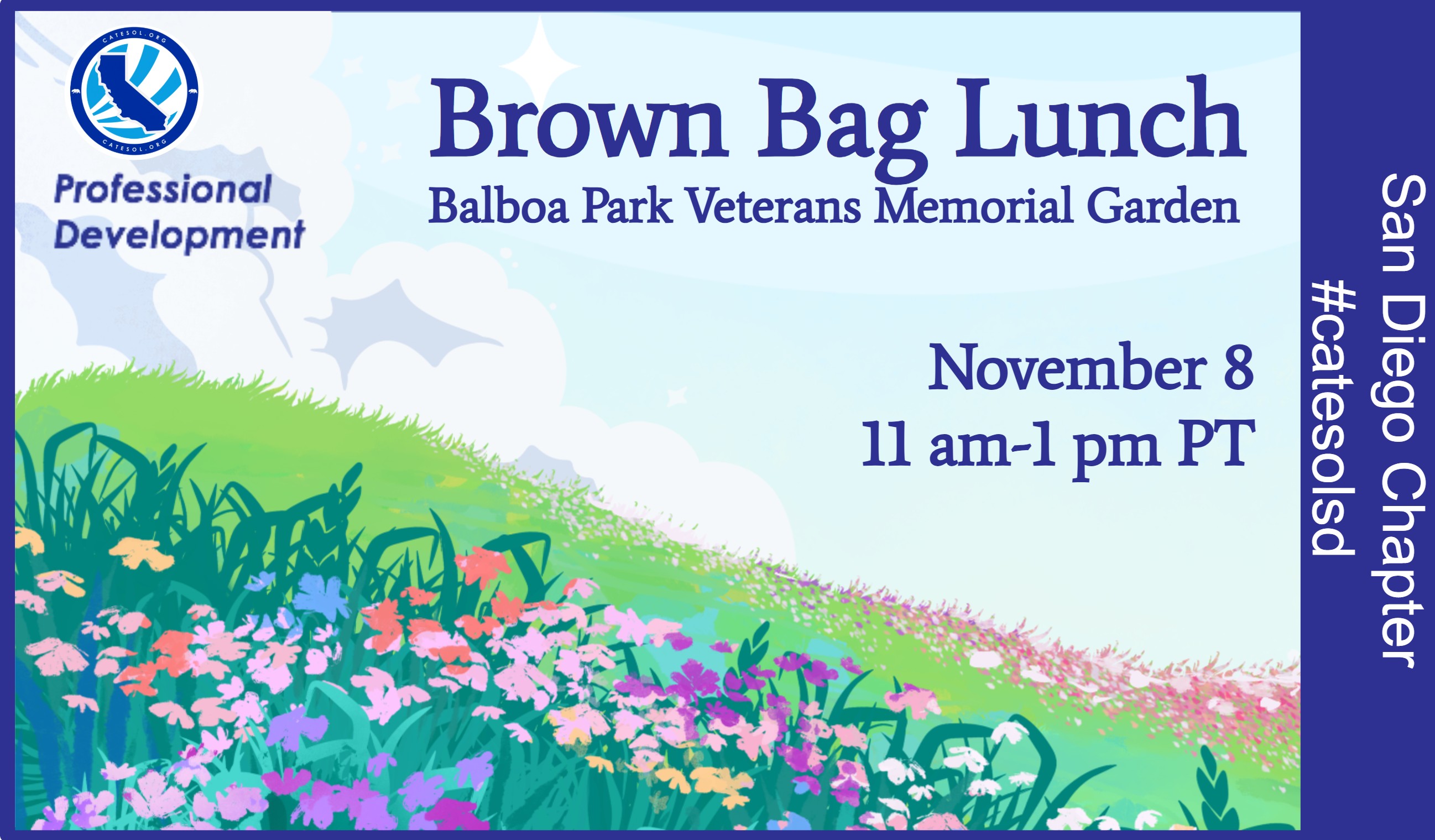
Take a break and join us in the park!
Come connect, decompress, and enjoy great company at our informal brown bag lunch in beautiful Balboa Park!
It’s a FREE event — open to both members and nonmembers. Bring your lunch, relax, and spend a couple of hours chatting and unwinding outdoors.
Date: November 8, 2025
Time: 11 AM – 1 PM
Location: Veterans Memorial Garden Air Section, Balboa Park
Just bring yourself, your lunch, and good vibes!
Silly Shakespeare for Students Book Series by Paul Leonard Murray

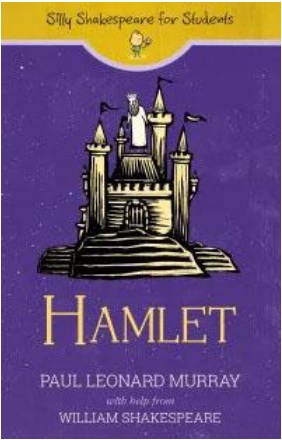
By Kara Mac Donald and Soonduek Lowney
Introduction
The use of theater arts in language education has gained increasing attention as educators seek innovative approaches to support second language acquisition and learners’ whole development. Beyond the role in fostering communicative competence, theater-like practices, such as improvisation, role play, and performance, offer learners opportunities to experiment with language in meaningful, contextualized or semi-real-life situations. For young adults, participation in theater-based activities not only enhances linguistic proficiency but also cultivates confidence, intercultural awareness, and socio-emotional growth. The book series, Silly Shakespeare for Students contributes to the field of ELT and language arts examining the pedagogical value of theater and performance in language learning settings. The books allow teachers to use adapted theatrical works both as artistic and educational platforms to engage learners cognitively, creatively, and personally.
CATESOL Event: CIRT-IG: Assessing Videogames for CALL Classrooms Using Corpora
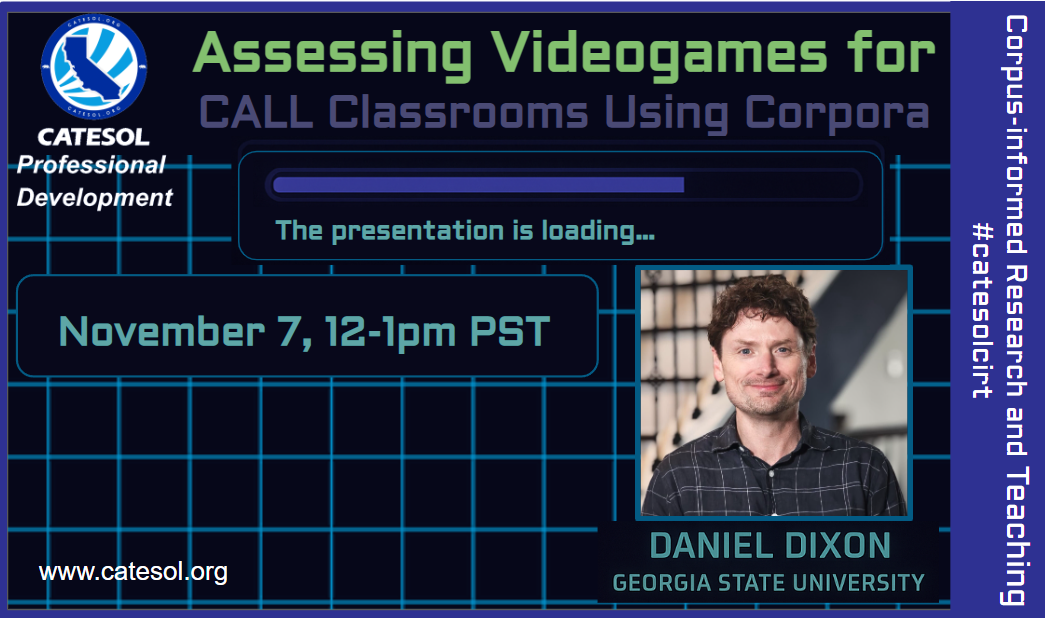
CATESOL Event on November 7th
Applied linguistics research within the domain of computer-assisted language learning (CALL) has given much attention to videogames and assessing their efficacy as tools for second language (L2) learning and development. This efficacy is synthesized in Dixon et al.’s (2022) meta-analysis reporting that videogames tended to have a medium-sized positive effect (d=0.65) on L2 development compared to learners receiving traditional instruction. Although encouraging, Reinhardt (2021) reminds us that not all games “are created equal” in terms of their affordances for L2 learning (p. 69). That is, the linguistic richness of videogames can vary wildly from games like Tetris that present virtually no language to the linguistically rich virtual worlds of games like Baldur’s Gate 3 which engage players with hundreds of hours of recorded speech and thousands of texts including millions of words. With millions of words in a single game, L2 educators taking a CALL-informed pedagogic approach may struggle assessing or identifying an appropriate title for their specific population of learners. In making this assessment, corpus linguistics tools and methods can yield valuable insight into the linguistic environments of videogames.
CIRT-IG: Should We Use ChatGPT Texts in ESL/EFL Teaching?
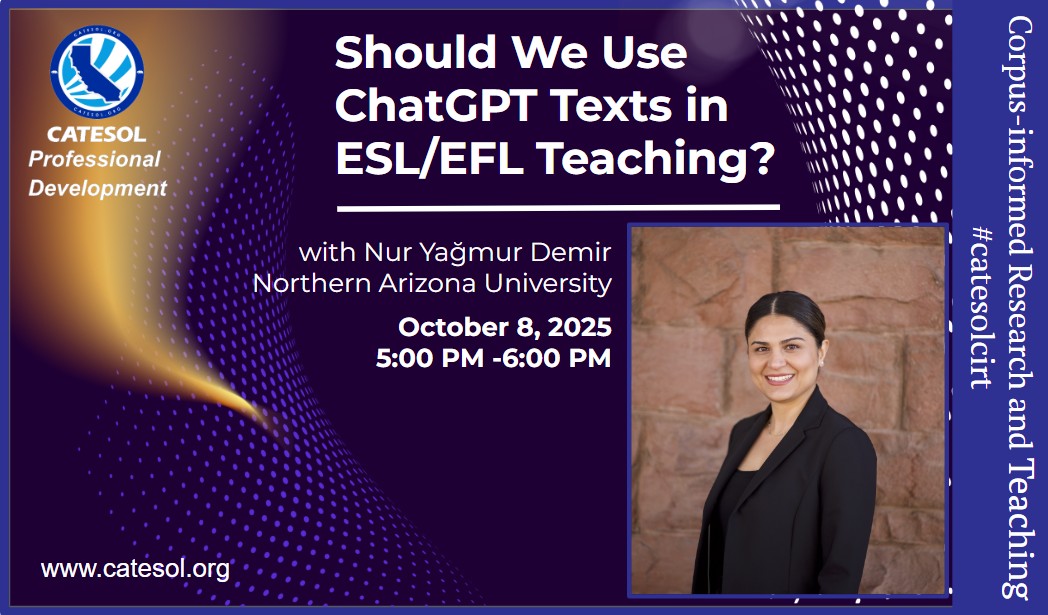
CATESOL Event on October 8th
ChatGPT and similar AI tools are rapidly making their way into language classrooms and testing, raising important questions for teachers: Are these texts really suitable for our learners? Do they truly reflect human language use?
This talk draws on a corpus study comparing AI-generated academic texts with human-authored ones to examine how well ChatGPT adapts to different registers (journal articles and textbooks) and disciplines (biology and history). While ChatGPT often produces fluent, coherent writing, our findings show that its texts do not always align with the communicative purpose of the register and often fail to mimic human linguistic choices.
For teachers, this means that ChatGPT can be a helpful tool for generating practice or testing materials, but it should be used carefully and critically. I will share concrete insights from this research, along with survey data from another study that complements the linguistic analysis with human perceptions.
Serving the Academic, Social, and Emotional Needs of Multicultural Newcomers by Brenda Custodio & Judith B. O’Loughlin
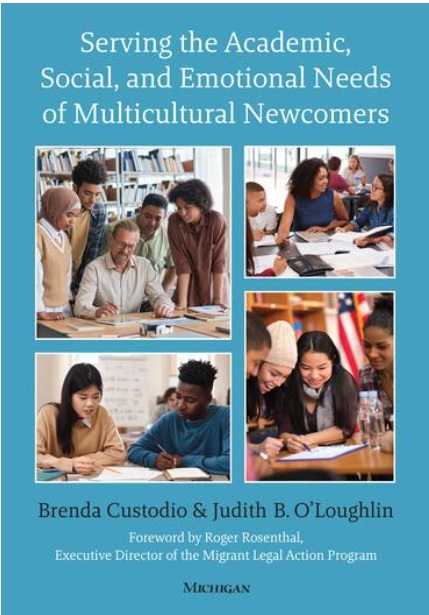
By Hazem Osman
Introduction
This book introduction starts by introducing the definition of newcomers in K-12 and the need to focus on newcomers. It includes types of support that newcomers need: academic, social, and emotional support. The authors briefly present the terms students with interrupted formal education (SIFE) or students with limited or interrupted formal education (SLIFE). Then, it briefly gives an overview of each chapter and what it focuses on. There is a list of five best practices for meeting newcomers’ needs that are presented in detail in the following five chapters.
Adult English Educators: Foundations of Scaffolding
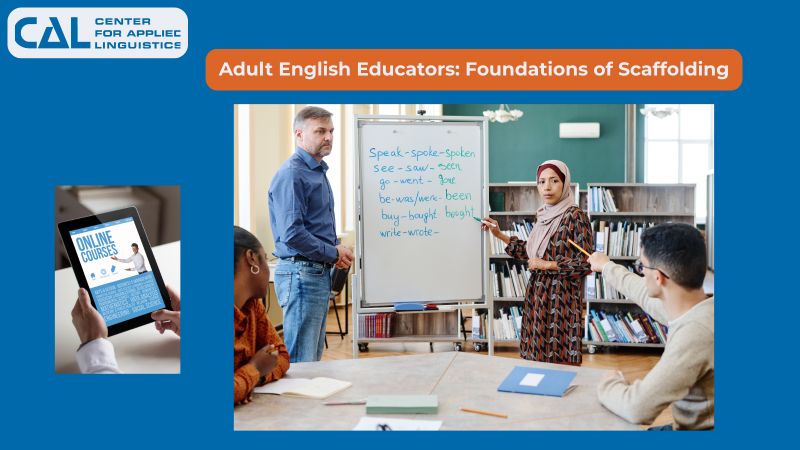
Register now for the CAL's new online course, Adult English Educators: Foundations of Scaffolding!
This self-paced course was developed by educators with extensive experience in adult ESL instruction. The course includes interactive scenarios, downloadable planning templates, and three focused sections: theoretical foundations, scaffold types and techniques, and classroom application. By registering now, you will gain immediate access to all course materials through September 28, 2025. This mini-course is self-paced, allowing you to begin learning immediately and progress through the content at your own pace.
Register: https://solutions.cal.org/online_education/adult-english-educators-foundations-of-scaffolding/
Language Classroom Assessment, Second Edition by Liying Cheng
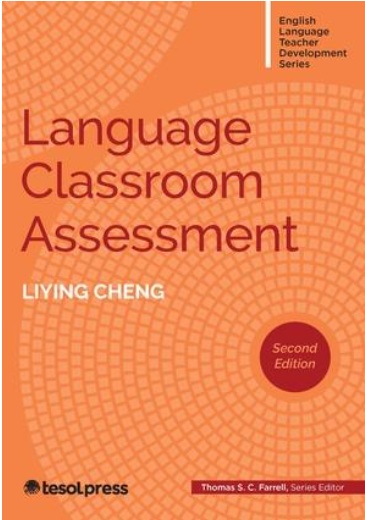
By Ragaa Shenouda and Kara Mac Donald
Introduction
The second edition of Language Classroom Assessment by Dr. Liying Cheng builds on the first edition’s clear guide to language assessment by delving deeper into key questions like “Have my students learned?” It incorporates the latest research and emphasizes the connection between teaching, learning, and assessment. The book equips English language teachers with practical knowledge to reflect on and improve their assessment practices, covering topics such as the difference between testing and assessment, key aspects of classroom assessment, effective tools and methods, and ways to motivate student learning through assessment. Suitable for both new and experienced teachers, this edition is part of the English Language Teacher Development Series, which provides accessible, theory-to-practice resources to help teachers update and refresh their skills.
ACADEMIC PUBLISHING IN ELT: PRACTICAL PATHWAYS, INSIGHTS AND REFLECTIONS
CATESOL Research Writers Interest Group (RW-IG) is hosting a webinar on 23 AUGUST 2025 from 9:00- 10:30 AM US PST (VIRTUAL Session).Description
In this session, the speakers will share insights into the often challenging but rewarding world of academic publishing in ELT. Drawing on their scholarly experiences across Japan, Korea, and the United States, the speakers will offer practical strategies for navigating the publication process—from critically reading the aims and scope of a journal to making sense of journal metrics and managing submissions (and, of course, rejections!). They will also reflect on how they balance scholarly ambitions with the professional realities of their local contexts.AUGUST 2025
Presenters
Dr. Nathanael Rudolph, Kindai University, JapanDr. Hyun-Sook Kang, University of Illinois, Urbana-Champaign, USA
Dr. Meerbek Kudaibergenov, Seoul National University of Science and Technology, Korea
Registration
A Registration Link is available at this link on the CATESOL Website.
CATESOL Members - $0
Non-CATESOL Members - $5
World Englishes: The Local Lives of a Global Language by Bertus van Rooy
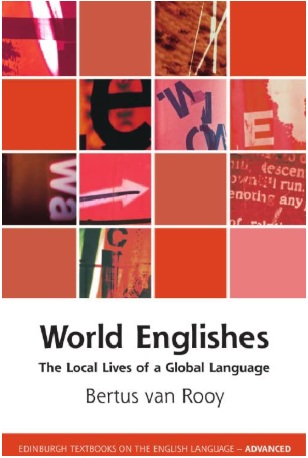
Noemí Castelo Veiga, Soondeuk Lowney, and Kara MacDonald
Introduction
The authors came to know the book World Englishes: The Local Lives of a Global Language by Bertus van Rooy through two different online reading groups organized by friends and colleagues this past winter. The book examines the social, historical, and linguistic forces that have contributed to the development of various English varieties worldwide. Online commentary boasted it offered a comprehensive exploration of how English has evolved from a colonial tool to a dynamic global language, shaped by diverse local contexts.
Social-Emotional Learning in the English Language Classroom, Fostering Growth, Self-Care, and Independence by Luis Javier Penton-Herrera and Gilda Martinez-Alba
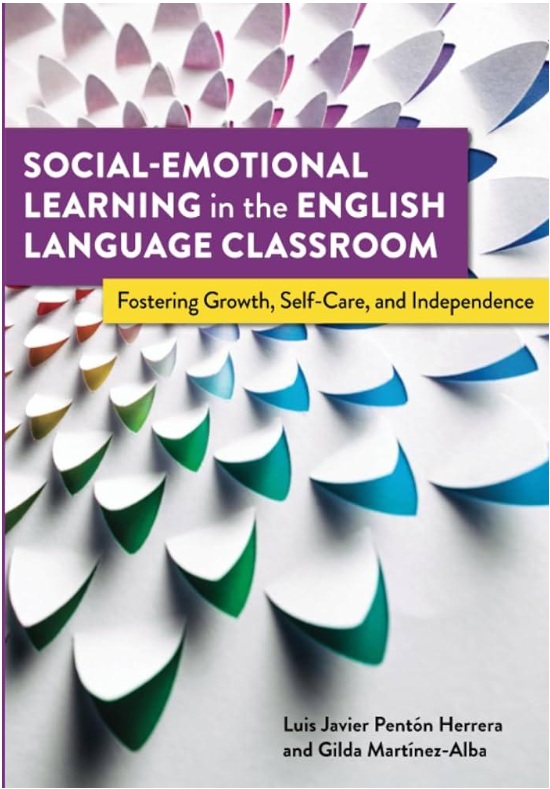
Unsoon Won and Kara MacDonald
Introduction
With the focus on meeting district and state testing goals, university IEP entrance requirements, graduation goals, and more, teachers are often predominantly focused on the academics of language learning to develop linguistic and cultural proficiencies, overlooking the social and emotional aspects of learning. Social-Emotional Learning (SEL) is the process through which individuals acquire and apply knowledge, attitudes, and skills to understand and manage emotions, set and achieve positive goals, show empathy for others, maintain positive relationships, and make responsible decisions (CASEL, 2020; Durlak et al. 2011; Elias et al. 1997; Zins et al. 2004). Attending to and utilizing SEL interventions are in the intensive and face-paced language programs ELLs are enrolled in. SEL enhances academic performance, personal development, and emotional well-being, while fostering resilience, reducing stress, and preparing students for real-world situations. SEL awareness and interventions help learners manage the anxiety and stress of learning the English language, while cultivating engagement and motivation.
Social-Emotional Learning in the English Language Classroom: Fostering Growth, Self-Care, and Independence by Luis Javier Pentón Herrera and Gilda Martinez-Alba offers a practical guide for integrating SEL into English language teaching. Recognizing the growing importance of SEL in education, the authors address the need for English language educators to be equipped with strategies that promote both linguistic and emotional development.
Using Home Language as a Resource in the Classroom: A Guide for Teachers of English Learners by Kate Paterson
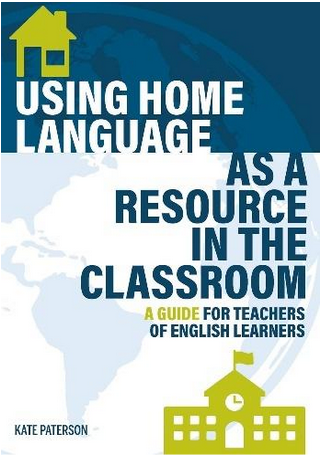
Review by Liza E. Martinez, EdD
The value of home heritage languages is immense, as they play a crucial role in shaping individual identity, maintaining cultural connections, and supporting cognitive development. This book was reviewed in June of 2022. The review was brief, in some way reflecting the length of the book compared to other reviews of longer texts. However, home/heritage languages in the classroom can be a fundamental resource for English language learners and instructors. Here, a more in-depth review of the book is provided to readers.
CATESOL Event
Bridging Fluency Assessment and Classroom Practice
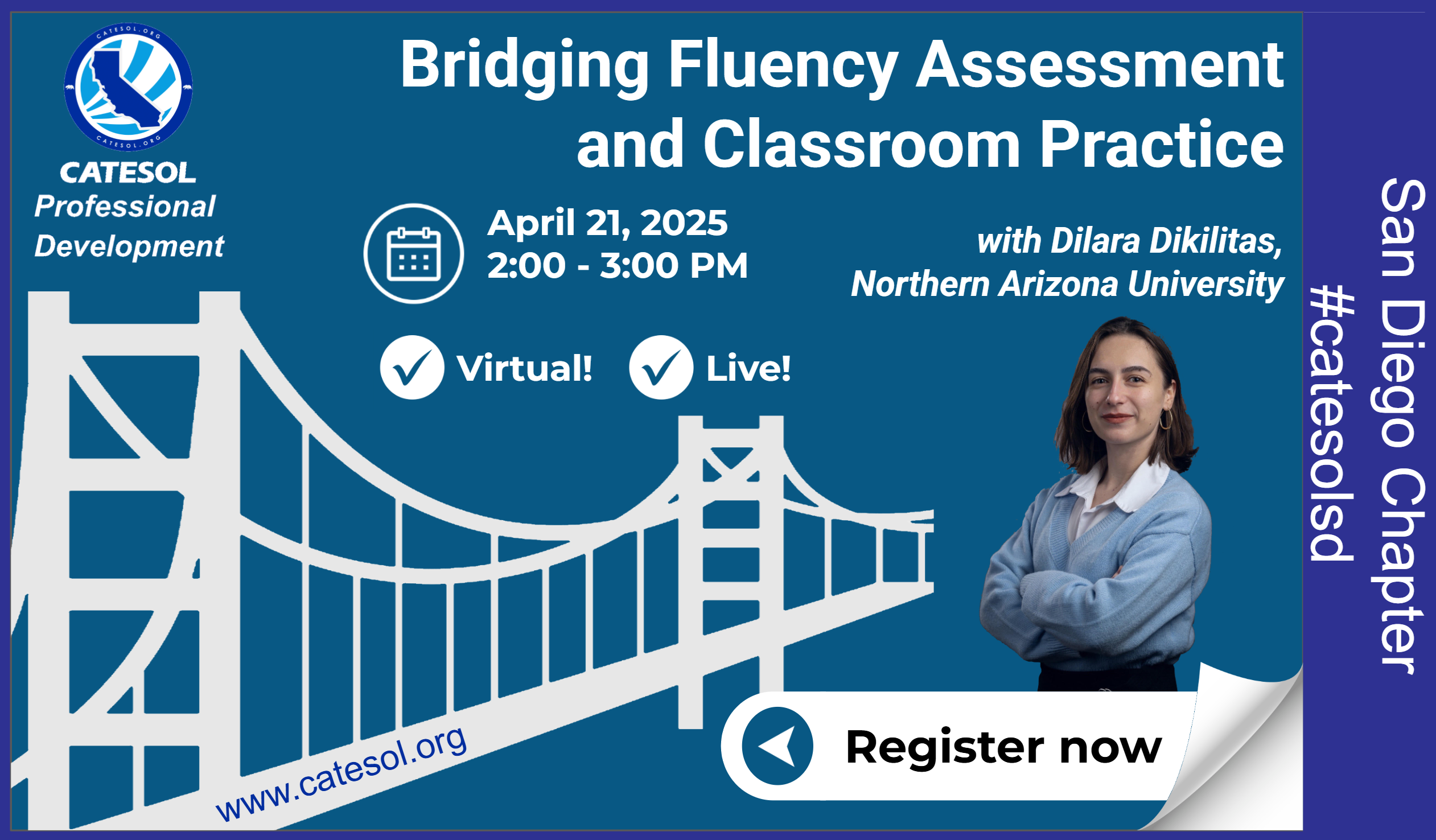
This presentation explores how language teachers can integrate fluency assessment into classroom instruction to support students' speaking development. Drawing on her research, she will introduce a structured assessment tool designed to measure fluency in both monologic and dialogic tasks. Through practical examples, she will demonstrate how this tool can be used to inform teaching practices, provide targeted feedback, and help students improve their fluency in meaningful communicative contexts.
San Diego Chapter Newsletter Released
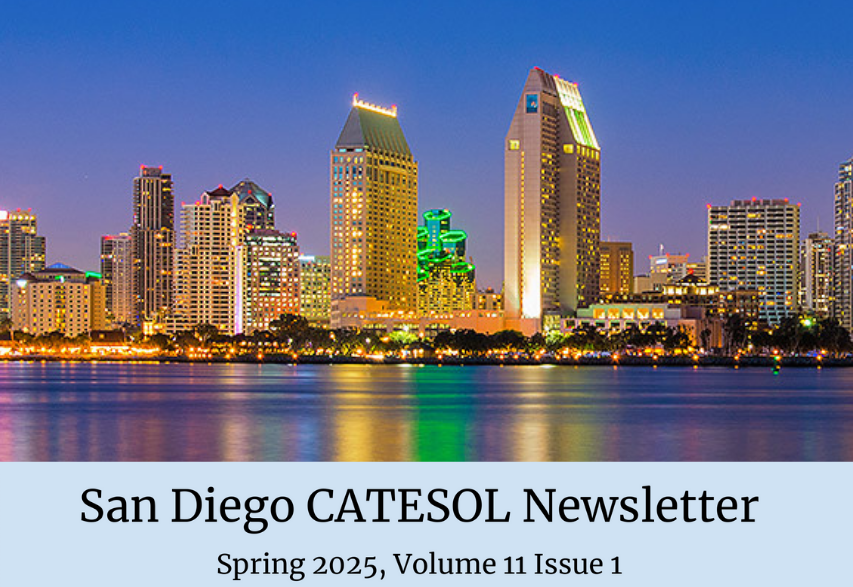
Greetings from the Chapter Coordinator
Christina Kaufmann, Freelance Instructor & ResearcherGreetings San Diego CATESOL! I would like to briefly introduce myself and describe what CATESOL has meant to me over the past two years. Originally planning to be a labor lawyer and union organizing researcher, I found that I could not sit still at my computer in my Chicago office and instead was far more inclined to visit members at their job sites. As such, I returned to my home state of Michigan in 2009 to teach ESL to farm workers in Sparta and Kent City - I never really looked back! Until 2022, I taught ESL in Grand Rapids with AmeriCorps, continued doing so in Washington, DC and Maryland, and moved to El Paso after an 18-month COVID quarantine. While in El Paso, I began to volunteer with One Digital World, a San Diego nonprofit that established computer labs in Tijuana migrant shelters. Visiting Pro Amore Dei and Espacio Migrante in Mexico was a quasi-religious experience for me and I pledged to move to San Diego ASAP.
TESOL25 is here!

It's not too late to sign up and volunteer at TESOL25 Long Beach! Meet TESOLers from around the world and contribute to the diversity by becoming a day-of volunteer at TESOL25 in Long Beach.
Grading with Integrity: A Research-Based Approach Grounded in Honesty, Transparency, Accuracy and Equity by Thomas. R. Guskey, Nancy Frey and Douglas Fisher
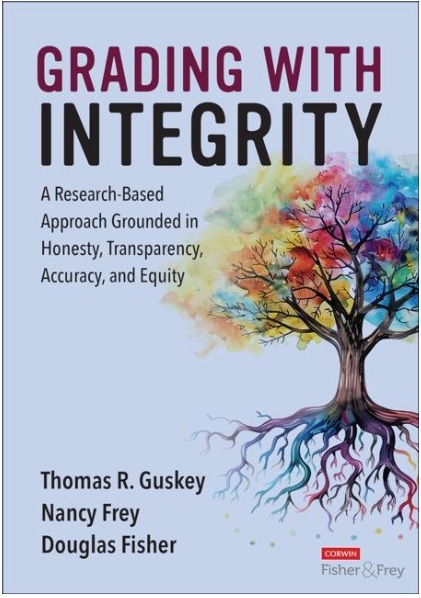
By Soondeuk Lowney and Kara Mac Donald
Assessment is a complex activity, and assessing language proficiency development adds another level of complexity as the focus is not on mastery of memorized information or a static set of skill actions. Some higher education institutions have opted for not using conventional grade systems for student assessment (i.e., formerly UC Santa Cruz, Evergreen State College). K-12 schools/districts have adopted alternative grading systems that move away from traditional letter grades (i.e., A, B, C, etc.) in favor of more holistic, personalized, and meaningful ways of assessing students' learning. This text offers a discussion around suggestions for documenting and reporting non-academic learning achievements to reflect learners’ growth in the K-12 context, based on research evidence.
Pursuing Professional Development: The Self as Source by Kathleen Bailey, Andy Curtis, & David Nunan
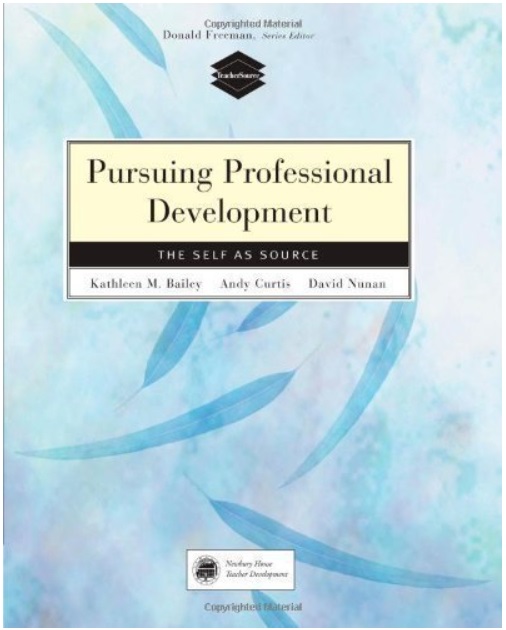
By Amel Farghaly
Introduction
Pursuing Professional Development: The Self as Source starts with a brief preface by the Teacher Source series editor, Donald Freeman. He succinctly explains that throughout the series, readers will encounter three strands: Teachers’ Voices (teachers in the field sharing their thoughts and experiences on the topic), Frameworks (the author’s reporting on key concepts and issues from the professional literature and community) and Investigations (tasks and activities designed to engage the reader and help them develop their own point of view on the topic). These strands are interwoven with one another throughout the book to deliver a text that is engaging and thought-provoking. Each chapter wraps up with tasks that are both introspective and practical in nature, as well as a list of suggested readings, along with the authors’ thoughtful notes for each suggestion.
Connect, Communicate, and Grow with ESL Board Games by Educational Trainer, Consultant, and Creator Sherry MacKay, M.Ed. TESOL

Have you ever led an ESL lesson so captivating that your students didn’t want it to end? Imagine them asking to come back during lunch to continue the activity. That’s the kind of energy The Language of Love brings to the classroom.
The Bonjour Effect by Julie Barlow and Jean-Benoit Nadeau

Roger Anderson
What does cracking the code of French conversation have to do with TESOL? This book was written by a French-speaking couple who lives in Montreal, Quebec. The wife is American, the husband is a native Quebecker, and their two adopted daughters are from Haiti. Together this couple gained notoriety through publishing two widely popular books on French culture, based on their four years (over the span of 15 years) living in France.
Cooperative Learning and Teaching by George M. Jacobs and Harumi Kimura
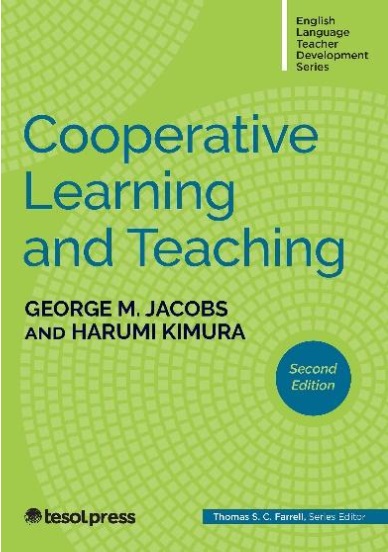
By Ragaa Shenouda and Kara Mac Donald
As teachers we all have set up students to participate in group work, but at times the implementation of the plan didn’t go as we imagined or expected. This book covers everything from why to use cooperative learning to the underlying principles that make such learning work. The focus of the review is on Chapter six through nine, as the authors viewed the first three chapters of the book as very valuable in laying out the basis for cooperative learning, while the following two chapters present foundational principles for effectively implementing it in the classroom. The second half of the book builds on these foundational chapters, and offers content that can be extremely valuable for both novice and veteran teachers. So, a longer summary in these chapters is shared for readers to have a good sense of the chapter’s content.
CIRT-IG Publication for CATESOL December Newsletter
The December issue of the CATESOL Newsletter will feature a Crow corpus project led by Shelley Staples, Professor of English Applied Linguistics and Second Language Acquisition and Teaching at the University of Arizona, and Bernard Cassie, a PhD student at the University of Arizona. The article will explore complexity issues within the Crow corpus, offering a summary for a teaching audience and discussing its classroom applications.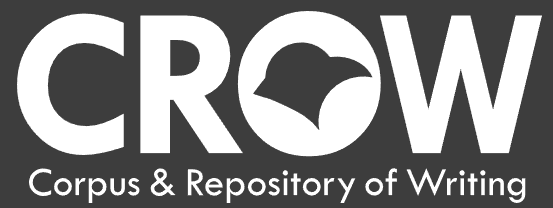
Post-CATESOL 2024 Conference Debrief
Join the San Diego Chapter for post-CATESOL reflections. Members will share their conference experiences such as what they learned, descriptions of their favorite presentations/workshops, a lightning talk version of their presentations, and ideas for next year's conference.Please join the San Diego Chapter for a post-CATESOL 2024 Conference Debrief.
Location: CATESOL Zoom Room
Date: December 6, 2024
Time: 10-11 am PT
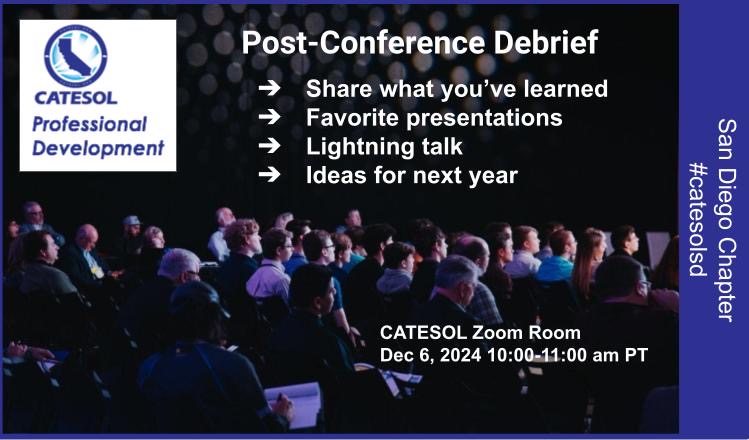
Teaching with Corpora -- App-y Hour!
CATESOL 2024 at CSULA
Friday, Nov 15, 1:30-2:30
KH B4015
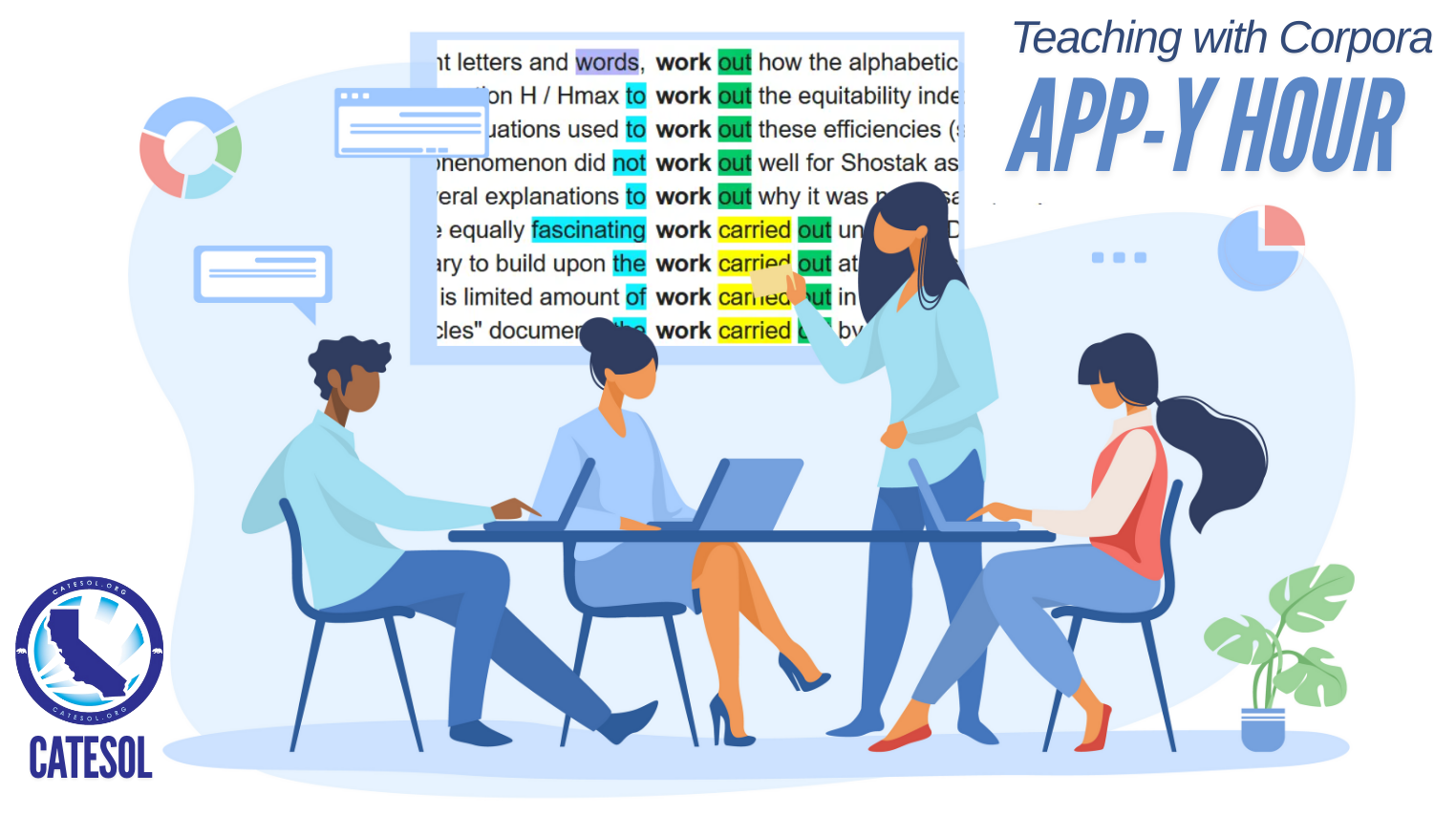
Looking for a few good participants:
Showcase a corpus-related app, platform, or digital resource in our lighting swap shop
Keeping it informal and low-stakes:
Just be ready to take 3-5 minutes to introduce us to the app/digital resource and a classroom or online activity idea
Share one, get many!
Sign-up here: https://docs.google.com/spreadsheets/d/1Vefd7bJWRPzzzMqnUVmO4ds268TJdmHMjJnztTAQm6Y/edit?usp=sharing
#catesolcirt
Implementing Integrated Performance Assessment by Bonnie Adair-Hauck, Eileen W. Glisan, and Francis J. Troyan
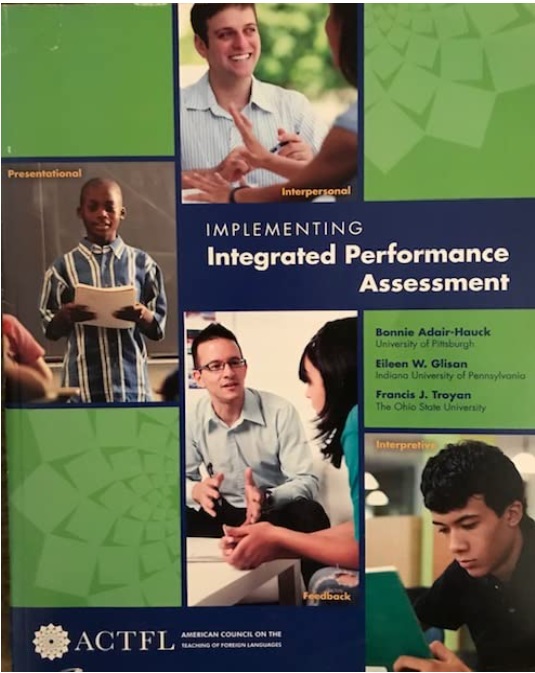
By Sonia Estima and Kara Mac Donald
Chapter 1: Rationale: Why the Need for Integrated Performance Assessment?
The opening chapter, Rationale: Why the Need for Integrated Performance Assessment, shares the development and increased need for learners and speakers of languages other than English to have both linguistic and cultural competencies in today’s interconnected world. The National Standards for Foreign Language Learning in the 21st Century (National Standards in Foreign Language Education Project [NSFLEP]) was developed to inform curriculum design and classroom instruction. The standards are built around five core areas i.e., Communication, Cultures, Connections, Comparisons, and Communities, known as the Five Cs of Foreign Language Education. With the established new standards, there follows a need to create assessment that measures learners’ proficiency development in the five core areas. Some background is shared about the predecessors for evaluating language proficiency for readers to see where the current NSFLEP falls in foreign language education and assessment. These proficiency guidelines for assessment have provided most state or national schools a common tool to assess language proficiency and/or curriculum and guide instruction. What was lacking has been an instructional based proficiency assessment, and so the Integrated Performance Assessment (IPA) was established to meet the needs of K-16 instructors, and fill in gaps, around implementation of meaningful assessment in the classroom in meeting the five core areas of the National Standards. The chapter describes the development of the backwards design and work in the field that has informed it.
Culturally Responsive Teaching, Theory Research and Practice, 3rd Edition
By Geneva Gay
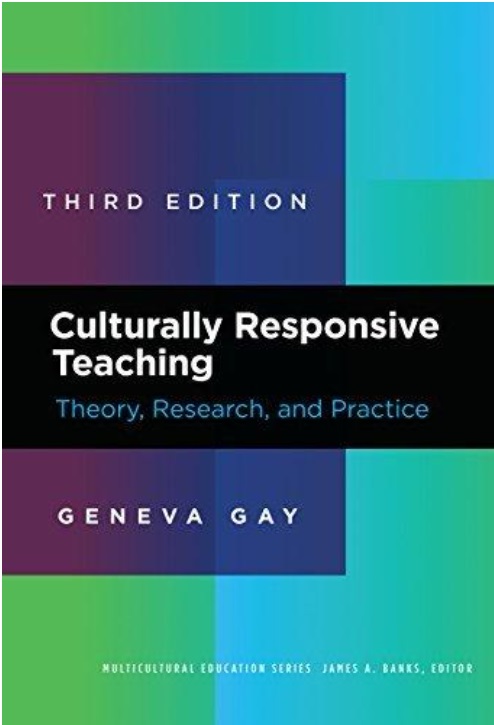
By Li-Yuan Liao, Chi-Ning Liu and Kara Mac Donald
Introduction
Culturally responsive teaching (CRT), a research-based approach to teaching, recognizes and develops students' unique cultural strengths. It aims to connect students' cultures, languages, and life experiences with what they learn and experience in the classroom. The overall goal is to better assist students’ academic and personal cultural understanding and strengths, and in turn develop higher-level academic success. With the challenges and data around under-performing students of color, the book’s preface opens with a recap of the first book’s first edition as well as the current third edition, sharing that although some things have changed, many of the concerns that prompted the first edition in 2000 still exist today. A second edition was published in 2010, and the third edition in 2018. Although some time has passed since the release of the third edition, the need for awareness of CRT is still and possibly far more relevant as the field of education has continued to grow and has shifted as well as broadened its inclusivity to better meet all students’ needs.
Corpus-informed Research and Teaching Event
Learn about Corpus-informed teaching at the CIRT-IG's November event! The goal of this talk is to give CATESOL instructors practical ideas of how they can use corpus tools to improve students’ academic writing and speaking skills. The presentation will begin with a brief overview of corpus tools that are freely available online. Then, we will examine how these tools can be incorporated in the ESL class to bring examples of ‘authentic language’ to your classroom. Finally, we will share a collection of example activities that integrate corpus in the ESL classroom.
San Diego Chapter Fall Lunchtime Chat
Please join the San Diego Chapter for its Fall Lunchtime Chat! The purpose of this gathering is to offer the opportunity to reconnect after the summer and to informally share teaching ideas. By coming together, we hope to continue to expand social and professional connections within the Chapter.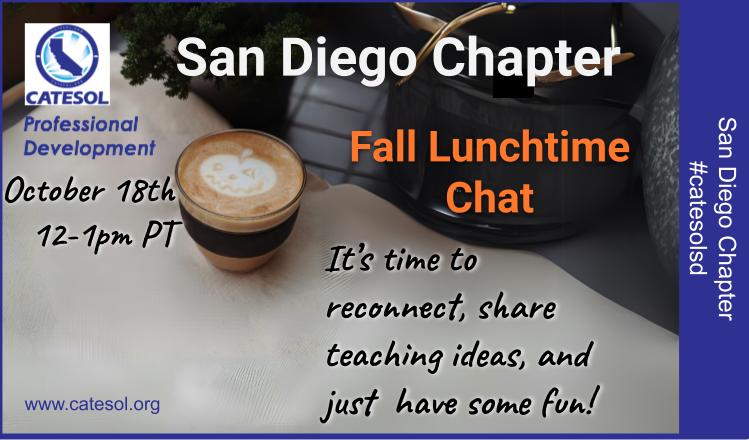
MACAWS Corpus Corner: Writing & Speech Learner Corpus Presentation
This presentation will introduce innovative ways to use learner corpora (collections of spoken or written texts from learners) in the language learning classroom, focusing on asset-based approaches to learner language. Example activities will be from MACAWS (a learner corpus of Portuguese and Russian), but principles shared will be applicable to English and other languages. Resources for a variety of languages will be provided.
Presenters: Asya Gorlova & Shelley Staples, University of Arizona
Hosted by: Ellie Kuznetsova & Margi Wald, CIRT-IG Coordinators
A Mentor Interview with Ela Gapeyeva: Teaching Young Learners

Learn best practices of making an EFL classroom a joyful place in this mentor interview with Ela Gapeyeva, a TESOL member, CATESOL conference site co-chair, and experienced teacher of preschoolers in Asia, Europe, and the United States.
Learning That Sticks: A Brain-Based Model for K-12 Instructional Design and Delivery First Edition 2014. Illustrated Edition published 2020
By Bryan Goodwin, Tonia Gibson, Kristin Rouleau
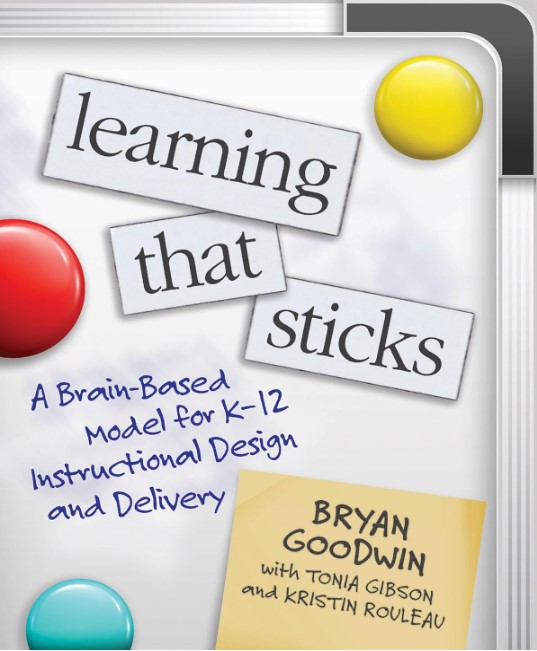
Roger W. Anderson, Independent Scholar, Monterey, CA
Forgetting is a natural human process. Fast learning means fast forgetting. The practices of basketball players and elite ice skaters teach us valuable insights about learning. These are a few of the many insights offered in the book Learning That Sticks: A brain-based model for K-12 instructional design and delivery. This enjoyable, quick read was designed for busy, classroom instructors. It summarizes key findings from cognitive science and presents them as actionable, classroom-ready tips for pedagogy.
A Mentor Interview with Victory Afghanistan

In this mentor interview, learn about Victory Afghanistan, a program that is helping teen girls and women to continue their schooling and pursue their goals.
Question: What are the goals of the students in your program?
Answer: Students join the Victory Afghanistan organization to, of course, improve their English skills and be able to have access to schooling and knowledge.
The Victory Afghanistan team aims to prepare these girls and women for online schooling: be that online high school, be that certificate programs if they have their degrees or building a platform for them to get ready for university programs. That is the goal mostly of students doing the program.
New Ways in Teaching with Games
By Ulugbek Nurmukhamedov and Randall Sadler
By Sonia Estima & Kara Mac Donald
The book, New Ways in Teaching with Games, offers a variety of creative and engaging games for teachers to use in their classrooms that require very little preparation time. The Introduction describes how the text provides recipe-format, at-a-glance activity descriptions to engage ESL/ELL/EFL students in the classroom through play. The book is divided into six sections based on the nature of and/or materials used to play the game. The categories are games played with pencil and paper, dice, tabletop boards, technology (i.e., online, apps etc.) and other miscellaneous equipment. Each section offers a variety of games, ranging from nine to fourteen or more. It would be impossible to provide a summary of each game presented, as the review would essentially be replicating the same content in the at-a-glance activity descriptions. The authors will share two sample activity descriptions that stand out to them to provide readers with the different types of games represented in the book for a wide range of students.
Scaffolding Language Development in Immersion and Dual Language Classrooms
By Diane J. Tedick and Roy Lyster
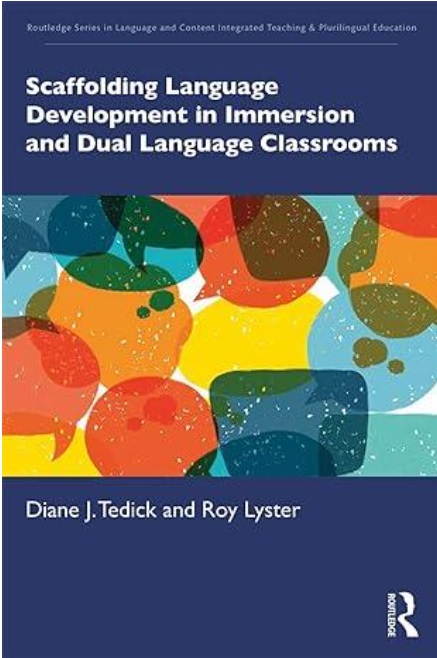
By Younah Chung & Kara Mac Donald
The authors found this book, Scaffolding Language Development in Immersion and Dual Language Classrooms, of interest because not only are immersion and dual language programs common in the U.S. but are increasingly educational options in non-L1 English speaking countries. In the differing contexts, parents enroll their children in such programs for distinct reasons but may be something that is aligned in order to provide a language and socio-cultural capital for their children. This text can be highly relevant for ELL educators.
Visible Learning: The Sequel
By John Hattie
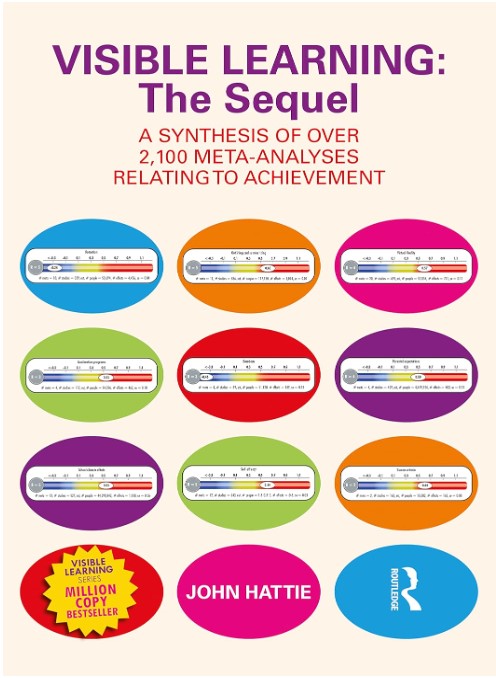
By Federico Pomarici & Kara Mac Donald
The author of the review’s text, John Hattie, has had three very successful publications on promoting learning. The first publication Visible Learning (2008) provided an overview of meta-analyses on successful learning outcomes, which was followed by Visible Learning: The Sequel (2023), released in part due to the popularity of the first publication of the topic. He also has a publication specifically directed towards educators, Visible Learning for Teachers: Maximizing Impact on Learning (2008). The text appealed to the authors as it examines the various factors that influence learning and achievement, addressing these factors in well-organized individual chapters.
Book Review Reflection: Working Collaboratively in Second/Foreign Language Learning
Edited by Maria del Pilar Garcia Mayo
By Kara Mac Donald
This book begins by sharing how collaborative language learning is supported and situated within research on cognitive and social cultural aspects of learning. In particular, Vygotsky’s (1978) work on learning being socially mediated. The editor then shares nine researchers’ work in favor of collaborative learning. This initial chapter lays the foundation for the following ten chapters authored by different individuals addressing different aspects of implementing collaborative learning in the language classroom.
Book Review Reflection: English L2 Reading: Getting to the Bottom
By Barbara M. Birch and Sean Fulop
By Soo Min Lee, Ed.D.
English L2 Reading: Getting to the Bottom, written by Barbara M. Birch and Sean Fulop, offers foundational knowledge on the brain organization and interactions between working memory and long-term memory. The main focus of this book is native speakers of English acquiring English from the very early stage of cognitive development to developing fluent listening and reading skills at school. Therefore, it starts off with the human brain organization and language awareness in early childhood. What’s important is that as children develop their cognition, it influences language awareness and vice versa. The authors point out that once a child has more developed language awareness, they have better support for reading and writing at school. Even though English L2 learners do not necessarily have language awareness issues in their early development, due to their various L1 backgrounds, they have to deal with a different writing system. As a result, English L2 readers go through interlanguage and language transfer in the process of becoming a fluent reader in English.
Working with Text and Around Text in Foreign Language Environments
Editors Halina Chodkiewicz, Piotr Steinbrich and Małgorzata Krzeminska-Adamek
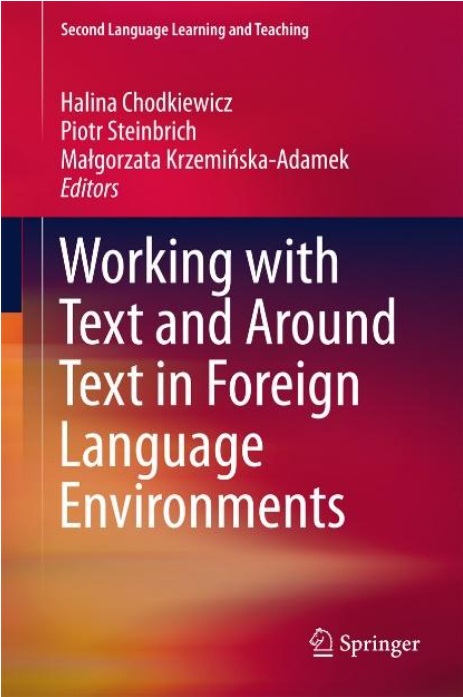
By Sumood Almawoashi, Amel Farghaly and Kara Mac Donald
As language teachers and curriculum developers, we work with pedagogic, semi-authentic and authentic texts on a regular basis. These texts are receptive input for learners; they serve as a model for creating their own written texts and as resources for teaching language, reading and writing. This text is divided into three sections addressing the receipt of L2 written input, the creation of L2 output and the analysis of texts for learning and language development.
The Art of Teaching Speaking: Research and Pedagogy for the ESL/EFL Classroom by Keith S. Folse
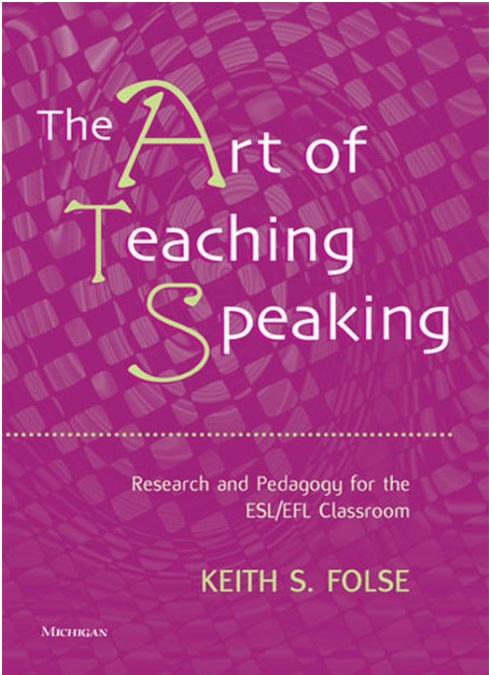
Liza Martinez and Kara Mac Donald
Introduction
Anecdotally teachers and students most often mention listening as a challenging skill to teach. Listening content is fleeting and difficult for learners to catch and often listening is tested (i.e., a one-shot chance to comprehend) in the classroom, rather than taught strategically. Although a distinct skill, much the same can maybe be said for the teaching of speaking in the classroom. As much as possible, students are placed in groups to communicatively negotiate meaning and outcome of collaborative tasks. However, how well are the learners’ age, proficiency, and short- and long-term goals considered in each segment of the instructional program. Additionally, how do these student and class specific needs intersect with language production outcomes and instructional approaches? This volume is based on theoretical foundations but consists of a repertoire of classroom informed scenarios and instructional activities.
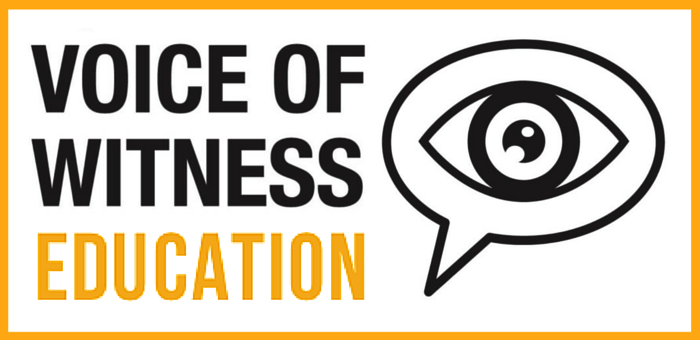
Voice of Witness is a nonprofit that provides students with inclusive and culturally relevant learning opportunities through oral history. Learn about how VOW builds critical thinking, social-emotional, and communication skills through these projects in the mentor interview below.
Learn four ways to leverage learning resources from the New York Times!
Photo credit: Adile Jones
The Biden-Harris Administration has recently launched the “Being Bilingual is a Superpower” initiative to promote multilingual education for a diverse workforce. New York State teacher and past president of NYS TESOL, Sarah Elia, writes for the New York Times on ways that educators can support this initiative. Multilingualism should be a path for ALL students.
Voices of Newcomers: Experiences of Multilingual Learners by Denise Ammeraal Furlong
By Lisa Fischler
Voices of Newcomers: Experiences of Multilingual Learners by Denise Ammeraal Furlong offers a practical guide with timely steps to “maximizing the learning experience that educators provide” for multilingual learners (MLs), students new to education in the U.S. (Newcomers), and “SLIFE (Students with Limited or Interrupted Formal Education)” (p. xii). Set within the context of culturally responsive pedagogy, the short introduction and eleven additional chapters demonstrate very helpful ways to cultivate inclusive, connective, welcoming, and supportive scholastic communities for the students comprising MLs, Newcomers, and SLIFEs. This accessible book reads easily and will be of interest to K-12 schools, including their instructors, staff, and students, particularly those who are most responsible for assisting MLs, Newcomers, and SLIFEs.
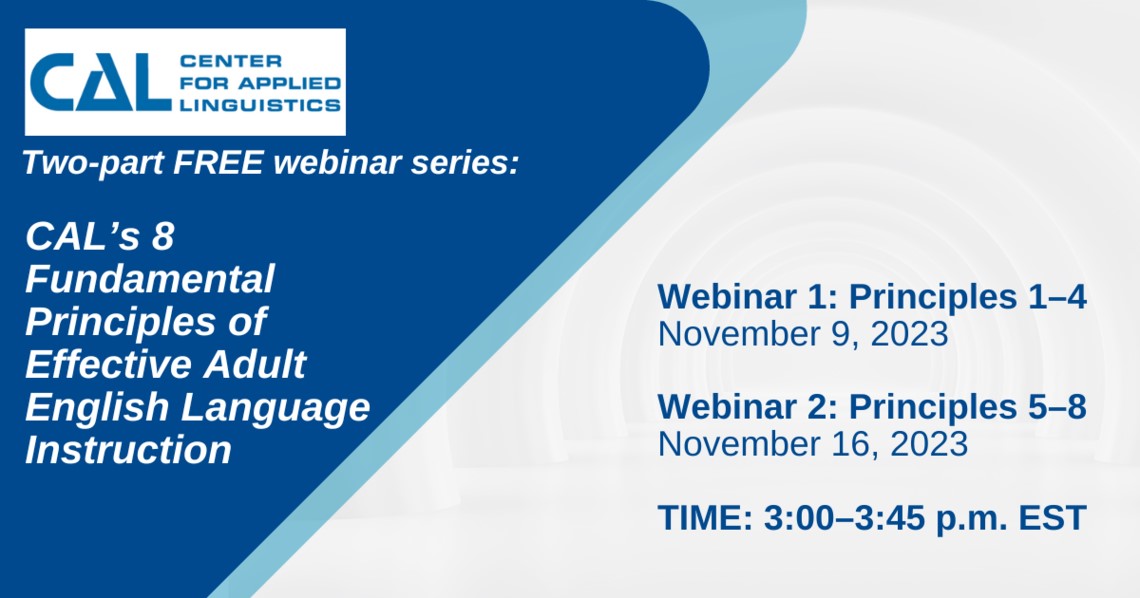
Unlock the power of effective adult language instruction!
Adult language education instructors, register now for TWO free webinars to elevate your teaching skills. Inspire your adult learners with techniques from CAL's 8 Fundamental Principles of Effective Adult Language Education.
Register: https://ow.ly/z78i50Q0oKM
[⭐] ️ Webinar 1: Principles 1–4
Nov 9, 2023 | 3:00–3:45 PM
Discover strategies for adult language instruction, including learner-centeredness, leveraging learners' assets, and incorporating all language modalities. Boost language proficiency with engaging classroom and virtual activities.
[⭐] ️ Webinar 2: Principles 5–8
Nov 16, 2023 | 3:00–3:45 PM
Enhance your teaching with insights on comprehensible input, developing metacognitive awareness in learners, and creating a supportive learning environment. Build an inclusive and engaging language learning experience with a toolkit of excellent techniques.
Register: https://ow.ly/z78i50Q0oKM
Language Teacher Identity in TESOL, Teacher Education and Practice as Identity Work, Editors Bedrettin and Kristen Lindal
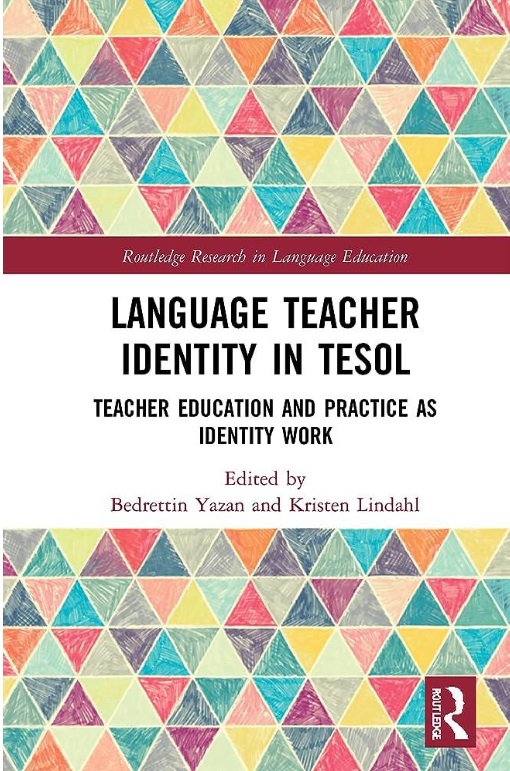
By Li-Yuan Liao, Chia-Ning Liu, Tingting Li, Qiong Wu and Kara Mac Donald
Introduction
By Kara Mac Donald
As the managing editor of the CATESOL Blog Monthly Book Review, under Michelle Skowbo as the editor, I have the custom to send out invitations to members and ELT/FLT educators to see if any of them would be interested in co-authoring an upcoming review for a selected book for upcoming slated reviews.
An ELT/SLA text of typical length got more interested responses than usual, and with no similar text slated for the remainder of the 2023 publication year, at that point in time, I accepted all those that were interested in writing a review for the book. It seemed crazy at first to have five authors for a 300-page publication, but after discussions it made perfect sense. Each interested author had an area of interest and/or personal affiliation.
Sticky Assessment: Classroom Strategies to Amplify Student Learning by Laura Greenstein
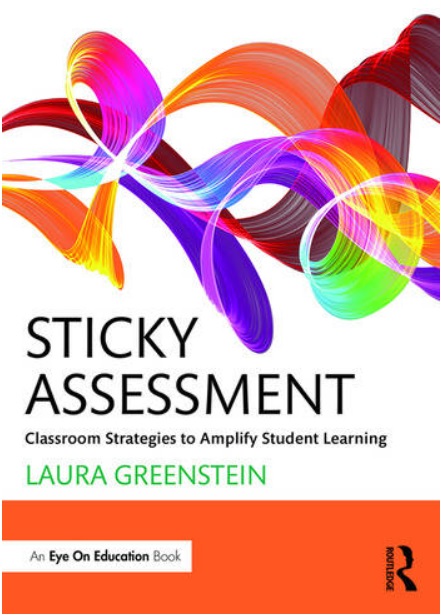
By Unsoon Won and Kara Mac Donald
The book is not fresh off the presses, and in fact is from 2019. However, the review authors have found it a useful text within their context as teacher trainers. It is a very short and accessible text that provides a foundational understanding of assessment from which both novice and veteran language teachers can benefit. So, they decided to offer a review to benefit others as well.
Making Professional Development Meaningful

"Cup of coffee, notebook with lined paper, pen, stickers, office plant on the wooden background." by Lia on FreePhoto.cc is marked with CC0 1.0.
In our first mentor interview, a school administrator shares his experiences with making professional development meaningful.
The Power of Language by Viorica Marian
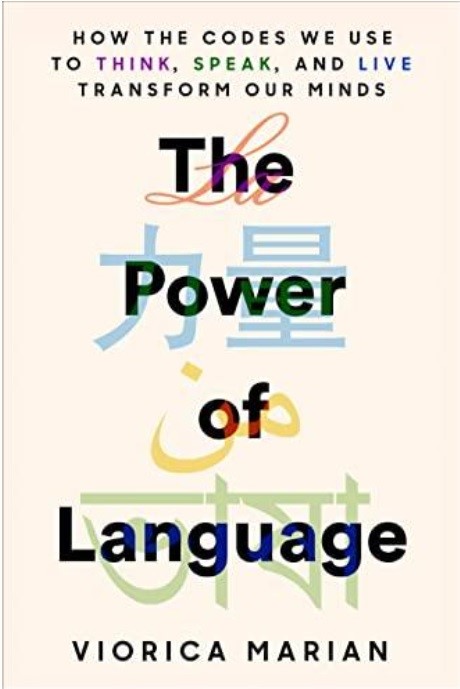
By Federico Pomarici and Kara Mac Donald
As language teachers, this book will likely interest you as it addresses the multi-faceted nature of language, its use, and its acquisition. The first part of the book is dedicated to how language influences individuals, and the second how language is used, created, and studied within society.
Exciting News: Introducing CATESOL's Brand New YouTube Channel!
Dear CATESOL Members,We are thrilled to announce the launch of our new YouTube channel, where a world of valuable insights, knowledge, and inspiration awaits you. As dedicated educators, we understand the importance of continuous learning and professional development, and our YouTube channel is designed to bring you just that!
Subscribe Now: https://www.youtube.com/@catesol_youtube
Assessment for Experiential Learning by Cecilia Ka Yuk Chan
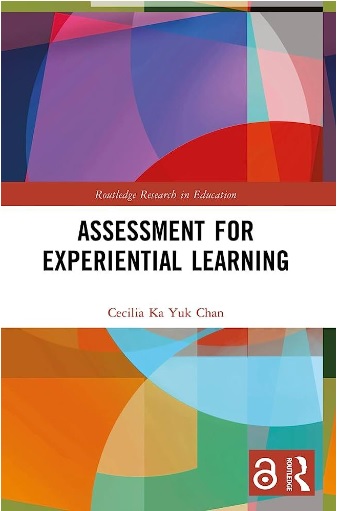
By Michelle Skowbo and Kara Mac Donald
True-to-life learning experiences can be deeply practical and motivating, so why aren’t they a greater part of students’ education? In Assessment for Experiential Learning, Cecilia Ka Yuk Chan acknowledges the numerous pitfalls that can sour students, teachers, and administrators against its adoption. Chan affirms that research supports the inclusion of experiential learning and gives steps for educators to make it meaningful and beneficial. She explores experiential learning issues, offers solutions, and tackles the often nebulous challenge of assessing experiential learning.
House Appropriations Subcommittee Threatens ELA Funding (Reprinted from the TESOL Advocacy Action Center)
The Fiscal Year 2024 (FY24) Appropriations cycle is in full gear, with the U.S. House Labor, Health and Human Services, Education (LHHSE) Subcommittee on Appropriations meeting last week on the fate of federal funding for multilingual learners of English (MLEs) and the English language teaching (ELT) educators who serve them.Call for Submissions: Mentor Interviews

"chatting" by zoetnet is licensed under CC BY 2.0.
Are you a new ESL teacher who likes to write?
Are you an experienced educator who enjoys sharing your experiences? Consider being part of a short mentor interview for the CATESOL Blog!
What is a mentor interview?
Interviews will consist of three questions and the interviewer will transcribe a “cleaned up” version. Interviews can range in length from 400 to 900 words.
Contact the blog@catesol.org to find out more.
CATESOL Book Review: Corpus Linguistics for English Teachers: New Tools, Online Resources, and Classroom Activities by Eric Friginal
![Image of [Amazon.com: Corpus Linguistics for English Teachers: Tools, Online Resources, and Classroom Activities: 9781138123090: Friginal, Eric: Books]](https://catesol.org/photos/CorpusLinguisticsForEnglishTeachersFriginal_06292023200658.JPG)
By Nicole Brun-Mercer and Kara Mac Donald
Corpus linguistics (CL) is growing, and it serves as a fantastic tool for English teachers to support their learners. As computers and web-based programs are increasingly available, classroom teachers can analyze students’ language production in large and mini-corpora. This permits a deeper understanding of learners’ vocabulary and language use patterns that can directly inform instruction.
Introducing World Languages in Elementary School
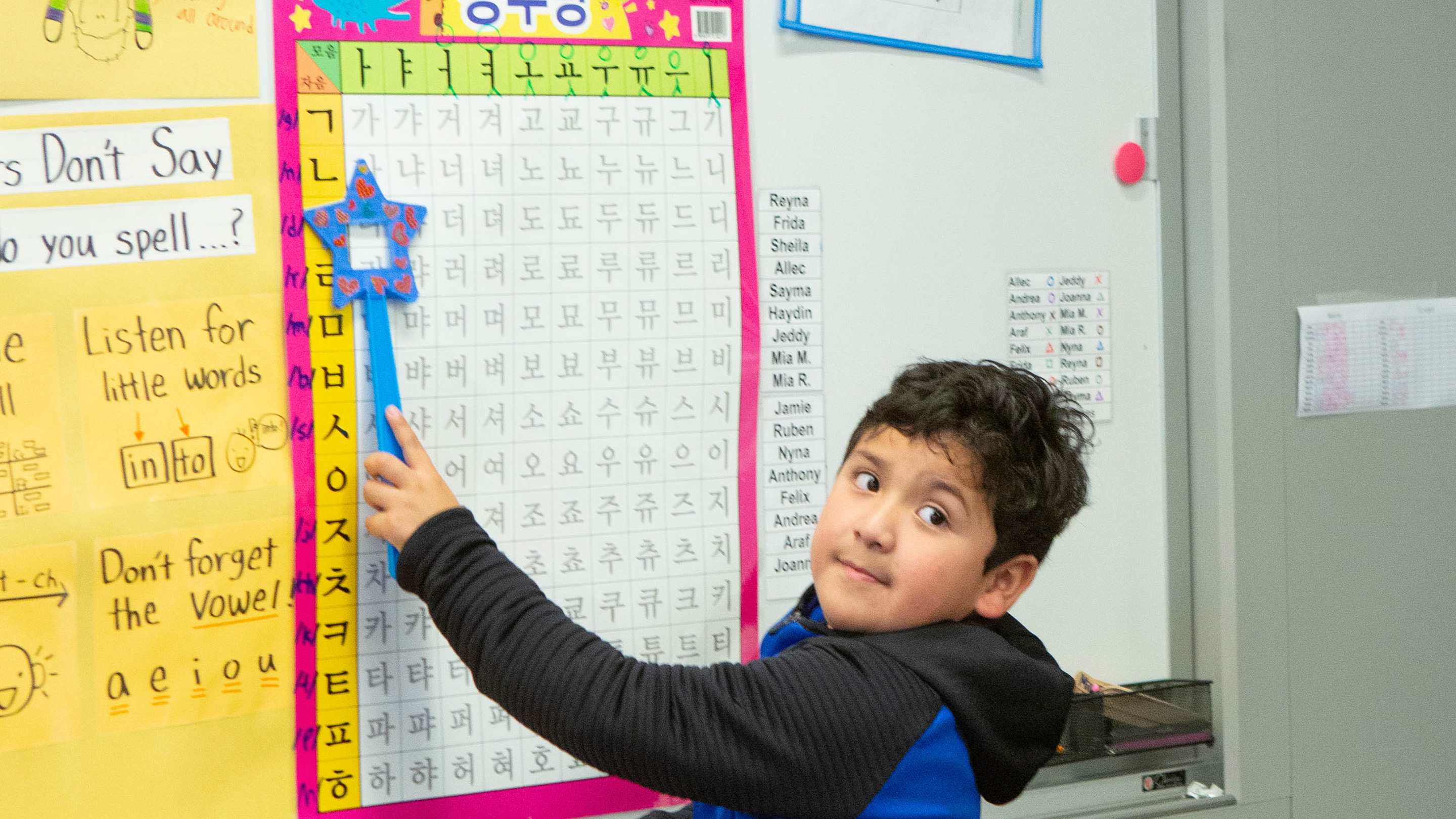
By Sarah Elia, NYS TESOL member and past president
For anyone who has ever wished for world language education in elementary schools, there’s so much we as parents, teachers, students, and community members can do even with little to no supplemental funding. Sarah Elia, a Past President of New York State TESOL, offers creative ways school communities can expose children to world languages on a daily basis, ultimately increasing empathy for the experience of all language learners including ours ELLs. Find out about simple strategies that are appropriate for younger learners (and some that can be adapted to adult learners as well) at this link!
CATESOL Education Foundation Presents
The 2023 College/University Level
English Language Research Award
This award is intended to encourage a wider range of scholarly work that may not often be represented in traditional scholarly venues. Through this award, CATESOL Education Foundation hopes to share a scholarship that highlights exceptional work being done in the field of ESL/TESL focusing on classroom-based research; curricular projects; well-argued bibliographic research regarding theory, research, pedagogy, and/or educational policy; and other types of research projects with clear pedagogical implications. Book Reflections – A New Column Post
Drawing on the CATESOL Blog Book Review posts, the Blog will be offering a monthly Book Reflections post that will be sole author or co-author pieces offering a reflective piece on one or more books related to ELT. The intention is to offer a personal narrative sharing article to promote (a) book(s) but not in the conventional chapter summary format of academic book reviews that may appeal to some members a bit more as readers or as writers. Inquiries: blog@catesol.org
Foundations for Teaching English Language Learners Research, Theory, Policy, and Practice by Wayne Wright
By Melissa Bourg, Kevin Tapee and Yeeun Choi
Overview
The history of the United States has always included immigrants, and most people who have arrived in the United States have not been native English speakers. In every generation one of the challenges faced by non-English speaking students has been to find a way to learn English to keep up with their native speaking peers. This challenge has been tackled by both lawmakers and educators, as the number of English Language Learners (ELLs) in the classroom continues to rise across the country. As a result of this ELL growth, state and federal laws have had to evolve, as well as the training that is provided to in-service and pre-service teachers.
Teaching L2 Composition, Purpose, Process, and Practice
By Dana R. Ferris and John S. Hedgcock
By Liza Martinez & Kara Mac Donald
This text is the 4th edition of a newly released publication of Teaching L2 Composition in early 2023. Previous editions have been highly popular among teacher trainers, in-service writing instructors, writing program administrators and L2 writing researchers. The fourth edition maintains the book’s fundamental structure with the first several chapters providing an overview of the fundamentals of L2 writing, followed by chapters addressing instructional practice, with the last several focusing on specific topics on L2 writing. This addition addresses new developments in L2 writing instruction, curriculum design and writing assessment. Additionally, reference lists have been added at the end of each chapter.
CATESOL Update: Membership Pricing
CATESOL has great news! The one-year membership rate is now a flat $30 for all! Our CATESOL Leadership feels very strongly that the proposed change to our membership pricing is integral in helping the organization continue to fulfill its mission of professional development, research, and advocacy viewed through the lens of diversity, equity, inclusion, and access.Starting on May 1st (Happy May Day!), when you log into the CATESOL website, the site will reflect this new rate. All one- and two-year members who have paid through at least April 30, 2023 will receive an automatic one-year extension of their existing membership. If you are renewing and your amount due is greater than $30, please contact Susan Gaer, our Membership Coordinator, at catesolsusan@gmail.com. She can help update your records and provide an invoice reflecting the new rate.
We know that there is still more work to do, so we are also working to ensure that our colleagues have equitable access to CATESOL membership, regardless of financial circumstances. In that spirit, if you feel that you can provide financial support for others to join CATESOL, please visit the CATESOL Education Foundation page to make a tax-deductible donation: https://www.catesoleducationfoundation.org/. Be sure to note that this donation is for the CATESOL membership fund in your donation submission.
We are excited about the access opportunities this new pricing structure will provide – and we hope that you will share this news with friends and colleagues to help us grow the organization. By increasing awareness and participation in CATESOL, we can remain solvent and provide even more member benefits and robust professional development and networking opportunities.
We appreciate the variety of ways that our membership supports CATESOL. We thank you in advance for your patience as we work through all the intricacies of this transition so that we can fulfill our goal of supporting all students, instructors, administrators, and others serving multilingual learners.
If you have any questions or concerns, please contact the CATESOL leadership at catesol@catesol.org
And below is a flier for you to share this great CATESOL membership news with your colleagues!

Welcoming Newly Arrived High School ELLs
By Sarah Elia, NYS TESOL member and past president
This recently published article sets the stage for creating a truly globalized school community from the physical environment to the educational opportunities in and out of the classroom. Not only do these simple steps support and welcome newly arrived high school English learners, but they also promote understanding, tolerance, and acceptance among all members of the school community. Further, the recommendations can be used in all school settings regardless of grade level. Please be sure to click on the embedded link to see examples from Saugerties High School in New York State.
Book Reflections - Our Inaugural Column
Drawing on the CATESOL Blog Book Review posts, the CATESOL Blog will be offering a monthly Book Reflections post that will be sole author or co-author pieces offering reflective pieces on one or more books related to ELT. The column provides a book review with a more reflective discussion or personal critique of a publication/s. The intention is to offer a personal narrative-sharing article to promote (a) book(s), but not in the conventional chapter summary format of academic book reviews, that may appeal to some members a bit more as readers or as writers.
Inquires: blog@catesol.org
The inaugural column for May 2023 is offered by Navneet Potti. For June, we have Foundations for Teaching English Language Learners Research, Theory, Policy, and Practice offered by Melissa Bourg, Kevin Tapee and Yeeun Choi. For July, check out an examination of four texts that prompted reflection from Dr. Tara J. Yosso’s Saturday Plenary at the 2022 CATESOL Annual Conference by Kara Mac Donald.
The Multilingual Self: An Inquiry into Language Learning
By Natasha Lvovich
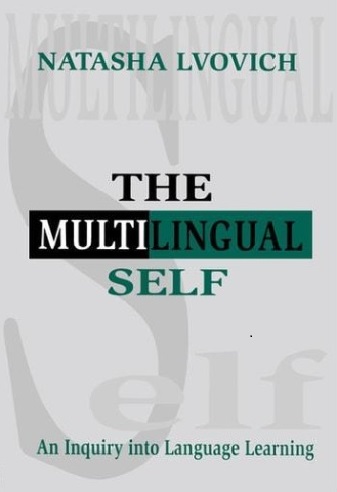
By Navneet Potti
In my head, all even numbers are either blue or red, while all the odd ones are either green or black. As I sit here and think of the number 8, my mind’s eye creates the numeral in a striking shade of indigo, and the number 7 appears in what I’ve seen being referred to as “forest green”. It’s been this way for as long as I can remember, my earliest recollection is from middle school and anything to do with numbers had me breaking into a sweat. Mathematics confused and scared me in equal measure, and I was constantly grappling with ways in which I could understand it better. I don’t remember what caused it, but I found that starting to think of numbers in terms of colors made them more approachable - friendlier even. It helped me understand mathematical concepts more easily and in a way that made the approach to learning more “mine” - something that worked on the basis of rules I had made and not something I was reading in a textbook or being lectured at by an intimidating adult standing at the front of my classroom. So when forced to think of the first few prime numbers, I would automatically think of the “friends in green” - 3, 7, 11, 13, 17 and 19 - standing smartly shoulder to shoulder. Or when attempting to learn the multiples of 12, my mind would fire up a silent fireworks display of blues and reds. Distracting? Maybe. But it did help drive the point home to my numerically addled brain and saved my skin on multiple occasions over my next few years of academic pursuits.
Differentiated Supervision: Growing Teachers and Getting Results
By Ann Mausbach and Kim Morrison
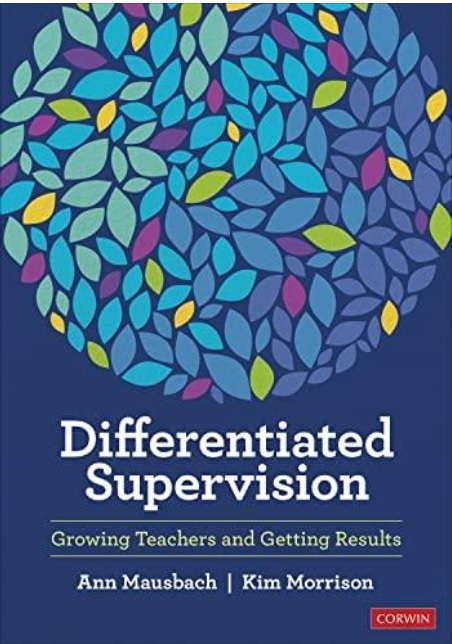
By Siyi Gao and Kara Mac Donald
As a school administrator, program manager or department supervisor, some responsibilities these senior educators have is to supervise their personnel, guide their professional development and conduct performance evaluations. Teacher supervision styles and processes are informed by personal approaches to leadership and schools’ evaluation systems. However, some factors that inform how leaders consider, or should consider, in supervising individuals is to account for their differences in the personal/professional goals and needs, readiness, and level of support required. Differentiated Supervision, Growing Teachers and Getting Results offers a model for supervision, understanding that schools are complex dynamic places, with many interconnected stakeholders, that is a comprehensive approach to effectively supporting teachers.
Expanding Literacy: Bringing Digital Storytelling into Your Classroom
By Brett Pierce
By Leslie Sherwood and Kara Mac Donald
Multimodal writing is commonplace in the online landscape. Articles of all kinds have print text alongside images, videos, and often links to other online resources. Students are constantly interacting with these multimodal texts throughout the day on their phones, tablets and laptops for school and leisure. It makes perfect sense to give students assignments that mirror these real-word texts. The author, Brett Pierce, advocates for middle and high school students to develop such multimodal texts to expand their literacies and share their voice. In fact, there are multimodal PhD dissertations. Although limited in number, even graduate education is embracing the practice as the academic and popular media publications are evolving. If higher education is coming on board, so should elementary and secondary education.
The Michigan Series in English for Academic & Professional Purposes, Volume 1, 2, 3 4
By John M. Swales and Christine B. Feak
By Sonia Estima and Kara Mac Donald
Academic Writing for Graduate Students (Swales & Feak, 2004), with subsequent editions, is a ubiquitous text used in/for academic research writing courses. The smaller short texts with a specific focus on particular aspects of writing a research manuscript were published a few years after (i.e. 2009). They also have been fundamental go-to-texts for academic research writing instruction. This review describes the value of the English for Academic & Professional Purposes series text as publishing educators, we have strengths and weaknesses across the different components of a research publication and a quick go-to concise source is beneficial. Also, for educators who are teachers of academic and research writing, there may not be a need based on student population to review all aspects of an academic research publication, and this series can offer an accessible engagement on particular areas of a research manuscript.
The series consists of four volumes: Volume 1: Abstracts and the Writing of Abstracts; Volume 2: Telling a Research Story: Writing a Literature Review; Volume 3: Creating Contexts: Writing Introductions across Genres; and Volume 4: Navigating Academia: Writing Supporting Genres. The structure and content of each booklet are summarized below.
Technology Enhanced Language Learning Interest Group
CATESOL TELL-IG
Presents Friday, January 20, 10:00 am - 11:30 am Workshop:
Vocabulary Tips and Tricks using Padlet for Classroom and HYFLEX teachers

It’s 2023! Time to brush up on your tech skills for In-Class and HyFlex teachers. The focus will be on innovative Padlet techniques for low-level through high-level learners. Additionally, we'll help you problem solve technology issues in the classroom and on HyFlex. Free for CATESOL members and only $5.00 for non-members. Register by going to TELL-IG January 20 Swap Meet or by going to CATESOL and click on the TELL-IG / Hyflex January 20th date, which will take you to the registration page.
For more information: CATESOL TELL-IG REGISTRATION
Visit our Padlet Page!
Cara Lazarus
TELL-IG Co-Coordinator
clazaruscatesol@gmail.com
Johanna Gleason
TELL-IG Co-Coordinator
jgleason.sdsu.edu@gmail.com
Envisioning TESOL through a Translanguaging Lens, Global Perspectives.
By Zhongfeng Tian, Laila Aghai, Peter Sayer & Jamie L. Schissel Editors
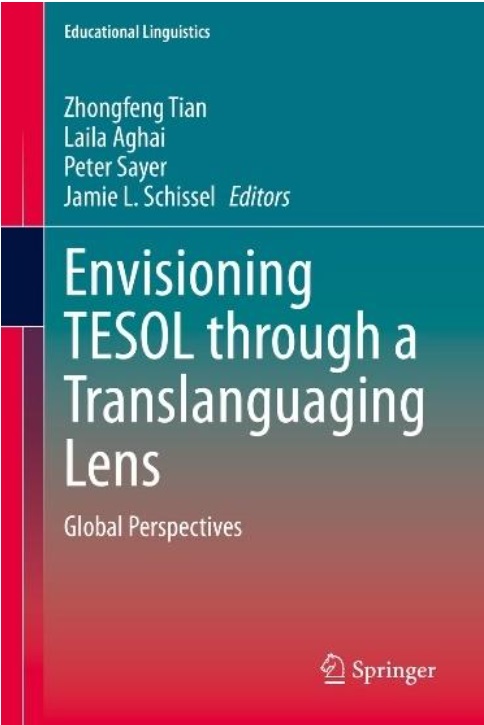
By Liza E. Martinez and Kara Mac Donald
This is part two of the review of Envisioning TESOL through a Translanguaging Lens, Global Perspectives. This portion discusses Part III: Translanguaging in TESOL Classrooms of the publication. If you missed the November Blog Book Review that discusses Part I: Theorizing Translanguaging in TESOL and Part II: Translanguaging in TESOL Teacher Education, please check it out at the November Book Review.
Book Review – Envisioning TESOL through a Translanguaging Lens, Global Perspectives
By Zhongfeng Tian, Laila Aghai, Peter Sayer & Jamie L. Schissel Editors
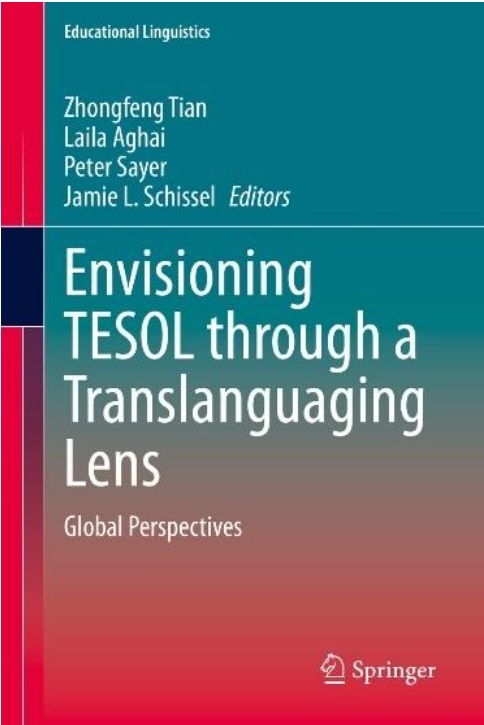
By Liza E. Martinez and Kara Mac Donald
Translanguaging is a somewhat new concept in linguistics and ELT, establishing presence in the early 2000s as means to discredit the notion in many western monolingual communities that the brain processes different languages separately. The term has been used to describe the use of multiple languages in a single situation. For ELT, translanguaging describes teaching students to become bilingual or multilingual through the use of two or more languages. This is a departure from former ESL paradigms that focused instruction on one language and excluded any other/s. This edited volume truly explores the practice of translanguaging in the ESL/EFL classroom across the global context, with contributions from authors in a multitude of instructional contexts and countries.
Book Review – Teacher Burnout Turnaround, Strategies for Empowered
Educators
By Patricia A. Jennings
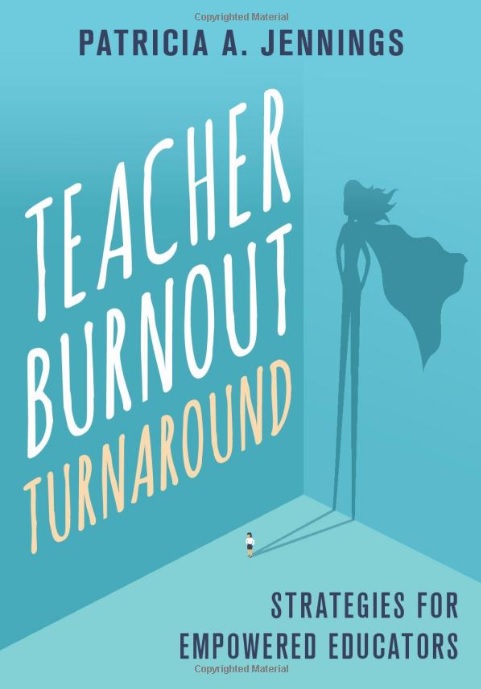
By Siyi Gao and Kara Mac Donald
Teaching has always been a stressful profession, but the extended year of teaching online due to
COVID-19 brought new and unexpected challenges. Now predominantly back in the face-to-face
classroom, we do not find ourselves in a return to the previous normal. The post-COVID-19
situation has generated additional and new challenges and stressors. Teachers often have a hard
time maintaining motivation, engagement with instructional practice and relationships with
students. With an increased level of teacher shortage and minimal funding for schools, there may
be even less time for professional development and self-care. This recently published text in
2021 is highly relevant for teachers who feel overworked, stressed out and less engaged in the
field, as the author shows readers, as teachers, how they can grasp the power to empower
themselves as educators.
Book Review – English and Students with Limited or Interrupted Formal Education
By Luis Javier Penton Herrera, Editor
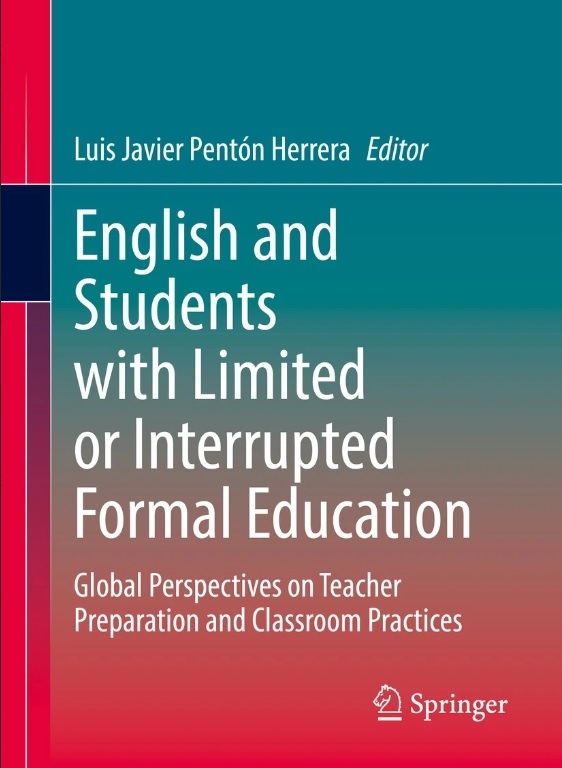
By Jun Li, Lorine Erika Saito and Kara Mac Donald
Students with Interrupted Formal Education (SIFE) and Students with Limited or Interrupted Formal Education (SLIFE) has been a topic of growing interest in ELT. Work around these subgroups of ELLs raises awareness of these learners’ specific needs, offers effective instructional approaches and interventions for language learning, supports students social acculturation, and emotional wellbeing, and advocates for policy reform. Three CATESOL members, Judy O’Loughlin, Brenda Custodio and Jose Franco, who have worked extensively in this area, are contributors to this edited volume. The volume showcases their academic engagement in support of SIFEs/SLIFEs, as well as many other well-known ELT researchers and professionals.
Book Review – Language Program Evaluation, Theory and Practice
By Brian K. Lynch
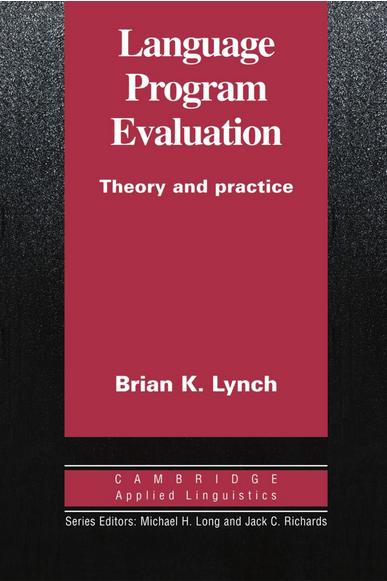
By José Franco and Kara Mac Donald
Conducting assessments of language programs whether for administrative quality control, program accreditation or action or institute research purposes is often a large endeavor composed of various forms of data from numerous stakeholders. This book is a great piece, offering an overview of program evaluation and applied linguistics a historical lens through which to see the evolution of the practice, different research frameworks and designs, and steps for conducting a context-based language program assessment.
Book Review – Listening in the Classroom, Teaching Students How to Listen
By Marnie Reed and Tamara Jones, Editors
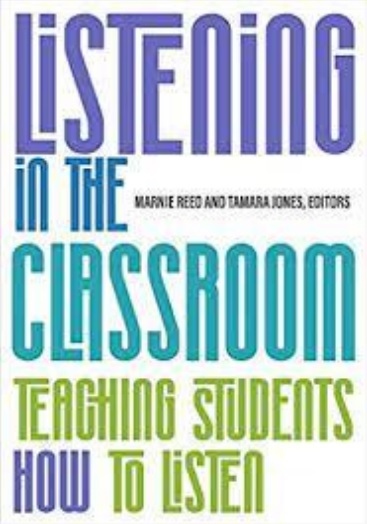
By Natalia Barley and Kara Mac Donald
Listening comprehension for most learners is a struggle. There are the small handful of learners that just seem to find listening in a foreign language as an easy skill, yet that isn’t the case for most learners. Many teachers too also find teaching listening a challenge as despite doing pre-listening activities and vocabulary preparation, many learners often grasp little of the listening passage. Teachers go back and use a variety of strategies to unpack the details of the passage for students, but they can feel less in control of the process compared to other skills. This book offers both novice and experienced teachers effective approaches to teaching listening, whether the information sheds new insight on instructional practice or simply is a refresher to refine classroom instruction.
Book Review – Effective Second Language Writing By Susan Kasten, Editor
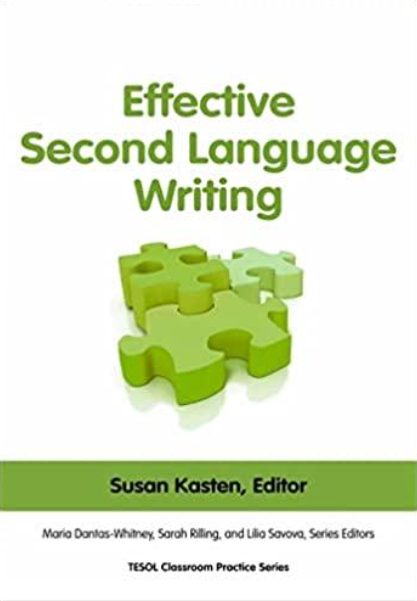
By Sonia Estima and Kara Mac Donald
Learning to write well is a challenging task, even in one’s own first language, and it can be much more intimidating in a second language. Also, writing, and second language writing, are not one monolithic skill, but have many distinct sub-skills, like paraphrasing, synthesizing, mastering different registers and so on. The chapter discussions are highly accessible and based within the described context of the author and each ends with a Reflection on the particular information shared with respect to why something was popular with students, change was implemented, and other reasons related to the chapter’s focus.
Book Review – Using Home Language as a Resource in the Classroom, A Guide for Teachers of English Learners
By Kate Paterson
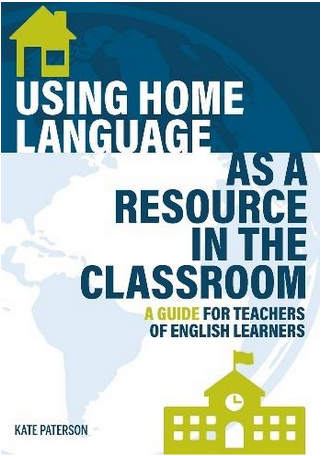
By Unsoon Won and Kara Mac Donald
Many teachers have English learners (EL) in their classrooms, not only in English as a Second Language (ESL) programs and/or classes but also in mainstream content classes across all levels of instruction (e.g. K-12, university). It is important for teachers to know how to appropriately support ELs for them to be successful. The book is short and very accessible, making it ideal for busy teachers who want to know how to better meet ELs needs in the classroom.
Book Review – Language Learning Environments, Spatial Perspectives on SLA (2021) by Phil Benson
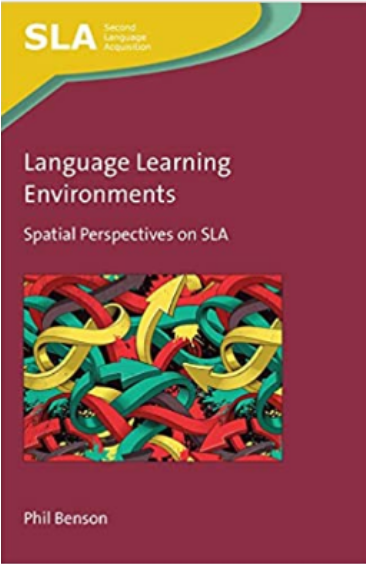
By Federico Pomarici and Kara Mac Donald
The book is slender and with only six chapters in the table of contents, it could be assumed that the author attends to the content superficially and that it is a brief discussion of spatial dimensions regarding SLA. It is far from that. It is a book that has been jammed full of content from theory to application into one short volume that both informs readers and provokes thoughtful reflection based on experience/s with the content discussed.
Book Review - A New English Grammar: American Edition (2021) by Andrew Rossiter
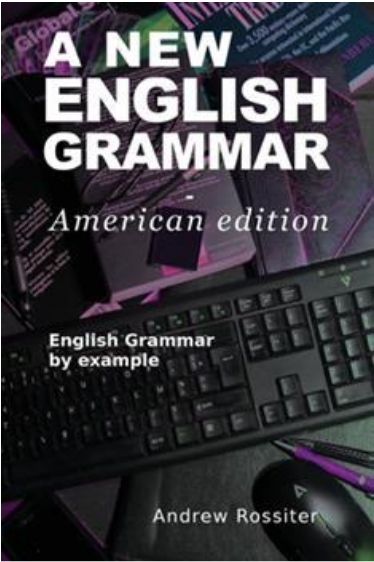
By Lisa Fischler
Utilizing a form-meaning-function (FMF) approach to language learning is important because “grammar is not merely a collection of forms but rather involves the three dimensions of (morpho)syntax, semantics, and pragmatics. Grammatical structures not only have a morphosyntactic form, they are also used to express meaning (semantics) in context-appropriate use (pragmatics)” (Celce-Murcia & Larsen-Freeman, 1999, p. 109). The reference book, A New English Grammar: American Edition, by Andrew Rossiter contains the elements of such a tri-dimensional approach to learning English grammar. This book is made up of four chapters that are entitled “Verbs,” “The Noun Phrase,” “Other Parts of Speech,” and “Sentences and Clauses.” This reference book is organized somewhat differently than most English as a Second Language (ESL) textbooks, but will work well as a companion to most textbooks designed to teach American English grammar.
Book Review – And Justice for ELs, A Leader’s Guide to Creating and Sustaining Equitable Schools
By Ayanna Cooper
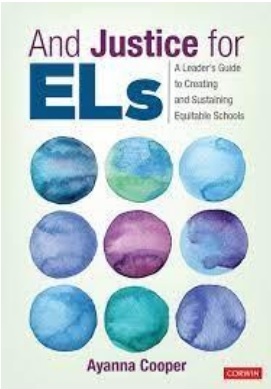
By Aylin Atilgan Relyea and Kara Mac Donald
Both new and veteran educational leaders are faced with providing more equity and inclusion for marginalized groups in their diverse school populations. Ayanna Cooper’s book underlines ELs’ civil rights to English language education and presents practices to deliver and sustain an environment for their academic success. Although geared towards district and school leaders, chapters address a broad range of topics and suggested practices that can also be informative for classroom teachers, as a metric of sorts to see how well their school is meeting the civil rights and educational needs of ELs.
Book Review – Enacting the Work of Language Instruction, High-Leverage Teaching Practices – Vol. 2
By Eileen W. Glisan & Richard Donato
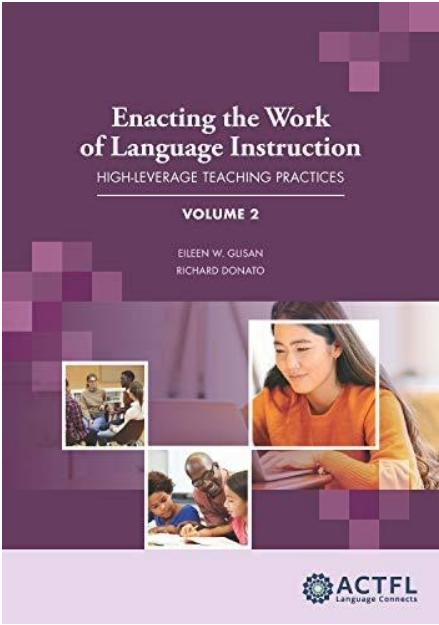
By Kara Mac Donald
This review examines the second volume in the Enacting the Work of Language Instruction, High Leverage Teaching Practices series. The first volume was reviewed in the November issue of CATESOL’s Blog Book Review column. As a recap the first volume Enacting the Work of Language Instruction, High-Leverage Teaching Practices (HLTPs) – Volume 1, was published in 2017, and was followed by Volume 2 just this past year (2021) and adds four additional HLTPs to the initial six offered in the first book.
Book Review – Empowering the Community College First-Year Composition Teacher, Pedagogies and Policies
By Meryl Siegal and Betsy Gilliland
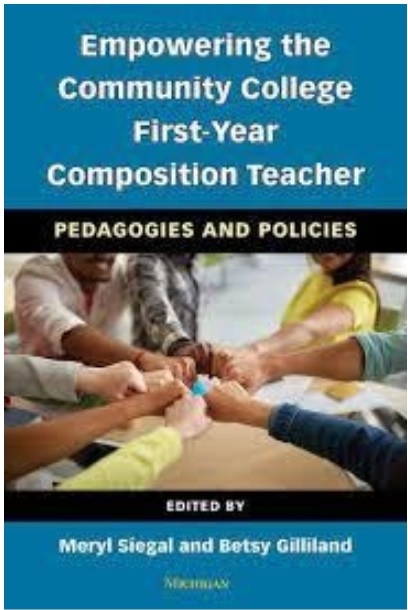
By Sonia Estima & Kara Mac Donald
For community college education in California, there was a significant shift permitting students to earn course credit eligible for transfer to a four-year university with the passing of AB 705 in 2017. The objective is to increase graduation rates from community college and transfer to complete a four-year degree, and initial data is suggesting this is so for California. This book is highly relevant within the larger discussion of equity and inclusion across the country, not only within California, as the role of community colleges serve an important access to further education and professional skills.
Book Review - Enacting the Work of Language Instruction, High-Leverage Teaching Practices – Vol. 1
By Eileen W. Gusan & Richard Donato
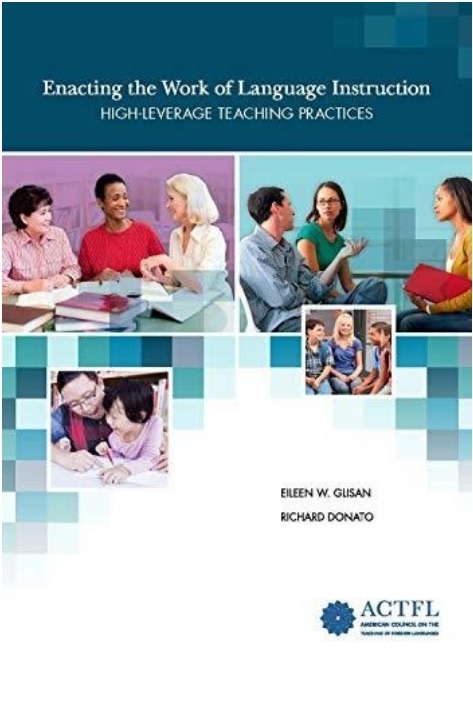
By Chia-Ning Jenny Liu & Kara Mac Donald
Enacting the Work of Language Instruction, High Leverage Teaching Practices consists of two volumes. Both books provide a set of practices that prepares teachers in training, new teachers, and veteran teachers to offer effective instruction, which have been used in numerous pre-service and in-service teacher training programs. The first book, Enacting the Work of Language Instruction, High-Leverage Teaching Practices – Volume 1, was published in 2017, and was followed by Volume 2 expanding the focus of practices in 2021 due the popularity of the first volume. Due to the relevance of both volumes for ELT and supporting learners, the November book review offers a review of Volume 1 and Volume 2 is reviewed in the December issue.
A Closer Look: Careers in Supporting ELLs
This Thursday, November 18th at 5:00 pm, the CATESOL Orange County Chapter and the CSU Fullerton TESOL Club will co-host a virtual career event called, "A Closer Look: Careers in Supporting ELLS." Our experienced panelists will offer career advice for those starting out or hoping to find new opportunities in the ESOL field. The event is open to all students and teachers in our field, and no prior registration is needed. Attendees can simply join the Zoom link. More details below.
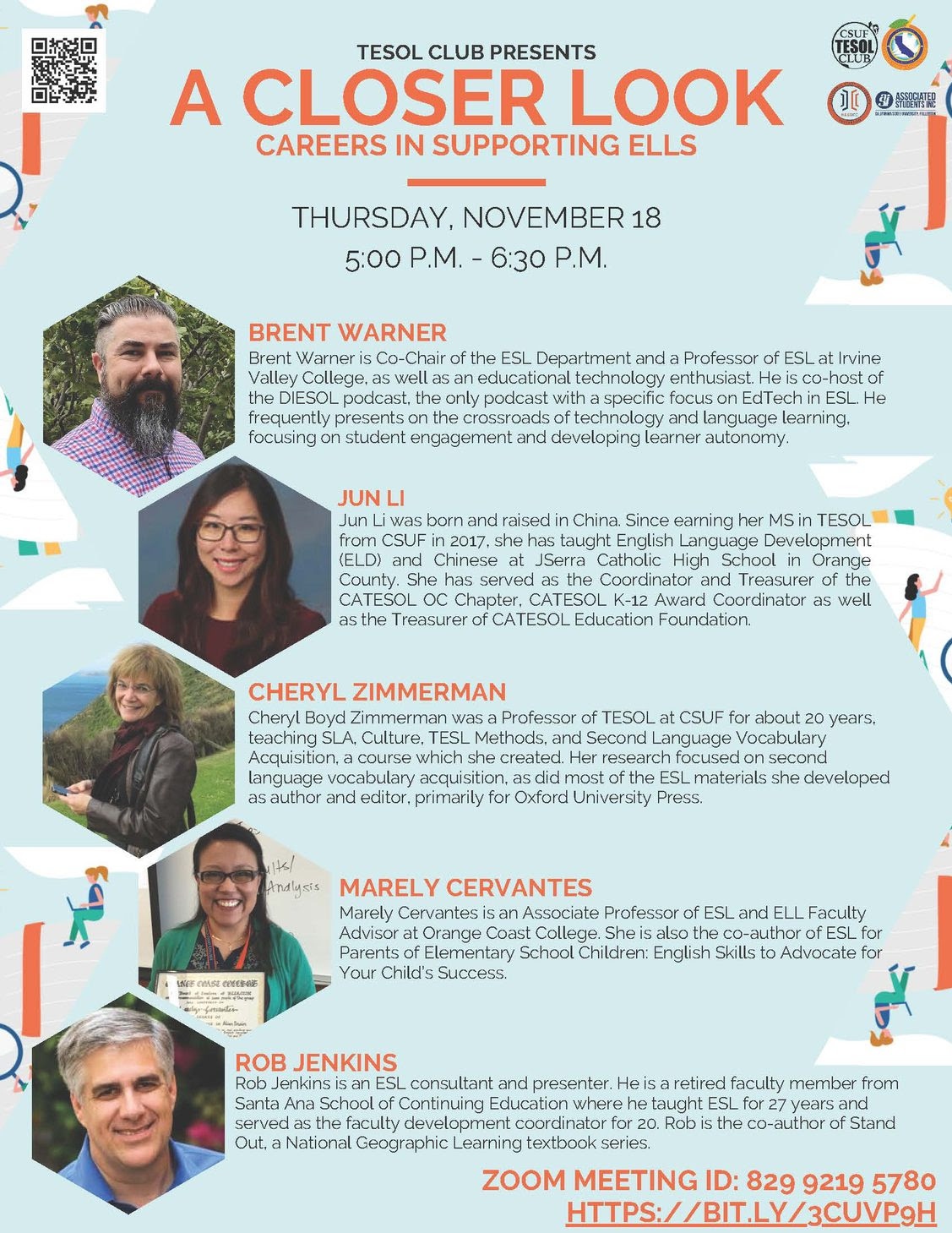
TESOL Guide for Critical Praxis in Teaching, Inquiry, and Advocacy
By Jennifer Crawford & Robert A. Filback, Editors
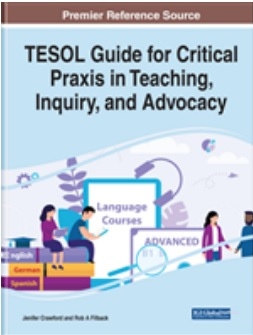
By Erin Kourelis & Kara Mac Donald
The book responds to the highly diverse population served by ELT and the TESOL field’s need to examine its rooting in the hegemony of the English language, the perpetuation of practices that favor some learner populations and disadvantage others, and the inherent bias in many instructional practices and curriculum content. The chapters are many and address a broad range of topics that will permit teachers to better support the diverse learners in ELT classrooms by discussing research and literature surrounding instruction, equality and social justice matched with example practical pieces for application in the classroom as a guide for readers. The book review is quite lengthy, as the edited volume is both fat (i.e. thick and dense) and phat (i.e. excellent), and to do the content justice, each of the twenty-five chapters need more than a few sentences to reflect the value presented in each of them.
The Interest Group Council is Looking for You!
As we plan for our Fall 2021 conference, we are looking for members who might be interested in getting involved in our 2021-2022 operating year as part of CATESOL's Interest Group Council (IGC).Our interest groups are managed by people like you, who are interested in a particular aspect of language education and wish to share their experiences and bring content and opportunities to our membership.
Currently, we have 12 different areas that might be of interest for you to consider. We are looking for coordinators and assistant coordinators in the following IGs (see list below). If you are interested or would like to find out more information, please contact the specific IG Coordinator or the IG Chairs. All of us will be delighted to provide you with more information about our IGs and how you can become a part of the IGC for 2021-2022! We look forward to getting to know you!
Bentley Cavazzi
IGC Chair 2020-2021
Daniela Lup
IGC Assistant Chair 2020-2021, IGC Chair 2021-2022
Marsha Chan
IGC Chair 2019-2020
______________________________________
Critical ELT in Action, Foundations, Promises, Praxis by Graham V. Crookes (2013) Routledge

By Sonia Estima & Kara Mac Donald
The book addresses the topic of critical pedagogy, where issues of social justice and democracy are incorporated in teaching and learning, with the goal of a critical consciousness to bring change to the world through critique and action. The topic is distinct from the current focus on Diversity, Equity, and Inclusion (DEI) and social justice in ELT, but it most certainly intersects with it. In some ways addressing DEI in the classroom, critical pedagogy can inform instructional practice, envision the curriculum and syllabus and the role of the teacher and learners. So, it seems like a relevant text to review at this time, as we as an association address the trends of making English language learning more equitable and accessible.
Book Review – Mindfulness in the Classroom; Strategies for Promoting Concentration, Compassion, and Calm
By Thomas Armstrong (2019) ASCD
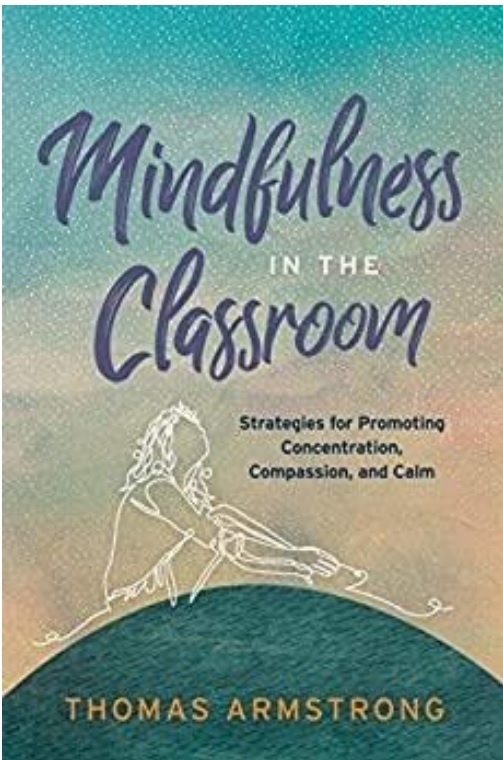
By Michelle Omidi & Kara Mac Donald
A year plus of classroom instruction being impacted by the COVID-19 pandemic in many cases heightened the need for mindfulness in the classroom to build resilience among teachers and students. As we transition back to the new normal of f2f instruction, there will be continued uncertainties and anxiety and this book is a guidebook of sorts on how to better care for us and our students, and foster awareness and resilience.
Hybrid Language Teaching in Practice; Perceptions, Reaction, and Results
By Berta Carrasco & Stacey Margarita Johnson (2015) Springer
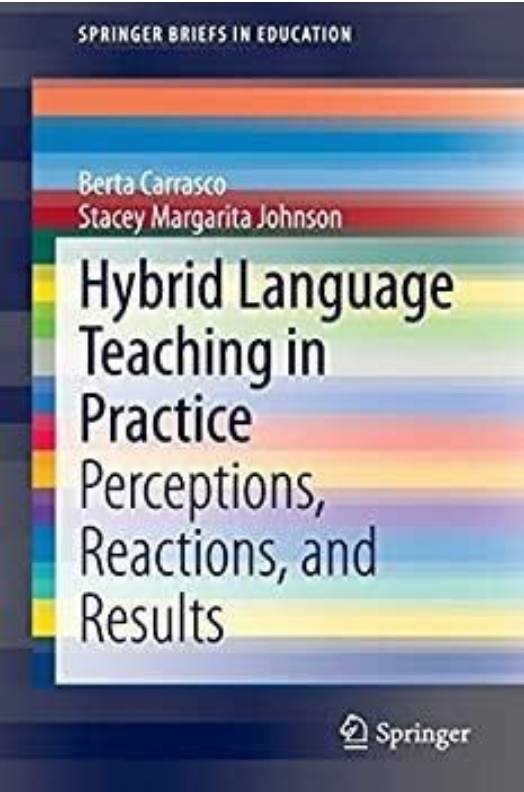
By Sue Shanley & Kara Mac Donald
Hybrid instruction was a common model for language courses prior to the pandemic, and in some educational contexts, its use may increase as we enter the new reality, post-pandemic. The authors wrote the book for secondary and postsecondary teachers responsible for hybrid instruction, but teachers in other contexts may benefit from its accessibility and relevancy as it focuses on how to design a hybrid course, technology considerations with pedagogy in mind, learner feedback, the authors’ perspectives on hybrid language teaching, and advice for teachers and students.
RW-IG Webinar Report: Action Research; Getting Your Feet Wet in Academic Publications
Sonia Estima & Kara Mac Donald
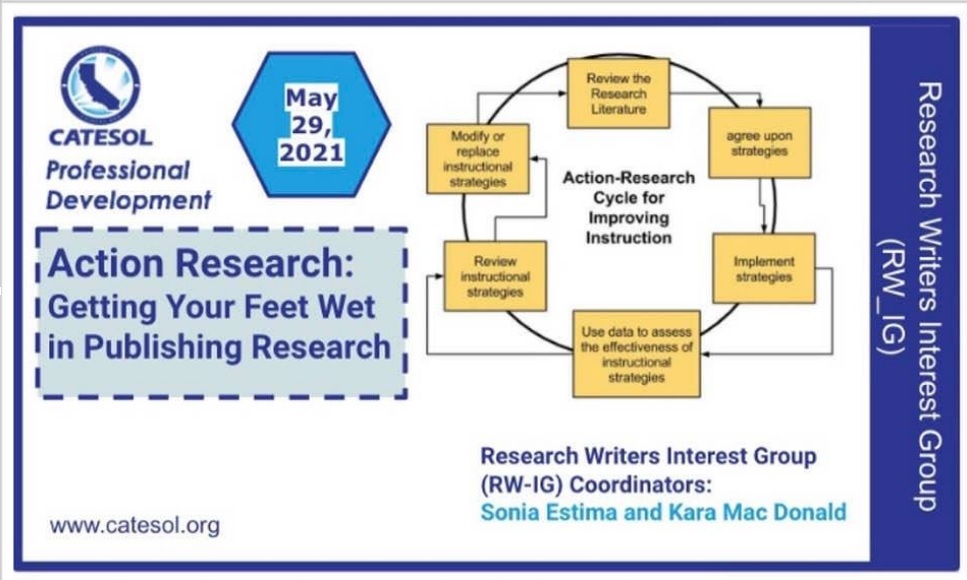
Introduction
Many teachers would like to publish their work but may not have sufficient experience to navigate the process independently. Other teachers may not yet be familiar with how to carry out a large-scale research project and write it up for publication. However, teachers are constantly engaging in reflective practice and further formalizing reflective practice into action research is an accessible way to improve instructional practice and enter the world of academic research publishing. The webinar is one in a series offered by the Research Writers Interest Group (RW-IG) to introduce CATESOL members to what action research consists of and how it can be drafted for publication.
Book Review – Rituals for Virtual Meetings, Creative Ways to Engage People by Kursat Ozenc & Glenn Fajardo (2021) Wiley
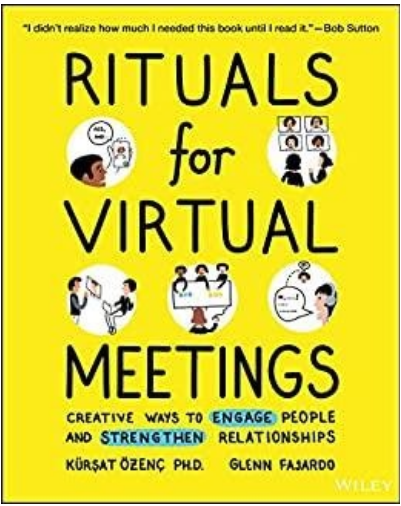
Supporting the Journey of English Learners after Trauma by Judith B. O’Loughlin & Brenda K. Custodio, (2020) University of Michigan Press
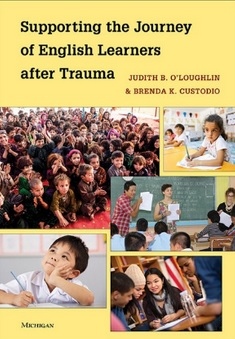
By Erika Saito and Kara Mac Donald
With the CATESOL Spring Virtual Conference on May 7th and 8th with a focus on transformation, inclusion, diversity and engagement, it seemed appropriate to feature a book addressing these focus areas for ELLs. Supporting the Journey of English Learners after Trauma, by Judy O’Loughlin, a CATESOL member, and Brenda Custodio, her longtime colleague and friend, engages with ELLs’ diversity and challenges to include them in the larger discussion to make an impact on addressing their specific needs and transform the field and the learners’ journeys. Since this group of learners is diverse, they define various terms related to learners intersecting with the experiences of immigration and trauma in the introduction to set the stage for coming discussions.
Book Review – 101 Activities and Resources for Teaching English Online, Practical Ideas for ESL/EFL Teachers by Jackie Bolen
By Leslie Sherwood and Kara Mac Donald
Teachers have continually sought ways over the last year to make online language learning more dynamic, incorporating engaging activities. The topic of sharing and engaging with resources for online learning activities is still relevant, even with the availability of a vaccine and lock-down restrictions being loosened as online learning for many students will continue as the situation is fluid across the state and nationally. There will be forms of hybrid instruction, some learner groups continuing full virtual instruction, while others may be returning in some form to the f2f classroom. The dynamic nature of what is to come requires teachers to continue to think outside the box for hybrid instruction and ongoing virtual teaching. 101 Activities and Resources for Teaching English Online, Practical Ideas for ESL/EFL Teachers is a super accessible, lesson activity tool kit with online teaching ideas and suggestions arranged across 7 sections with numerous activities offered within each section, and with a resource section at the end. Since each section offers so many activity ideas, with little to no textual discussion associated with each section, the book review will provide a brief overview of each section and a description of a few activities that stood out to give the reader a feel for the types of engaging activities offered.
Social Justice in English Language Teaching
Christopher Hasting & Laura Jacob, Editors (2016), TESOL Press
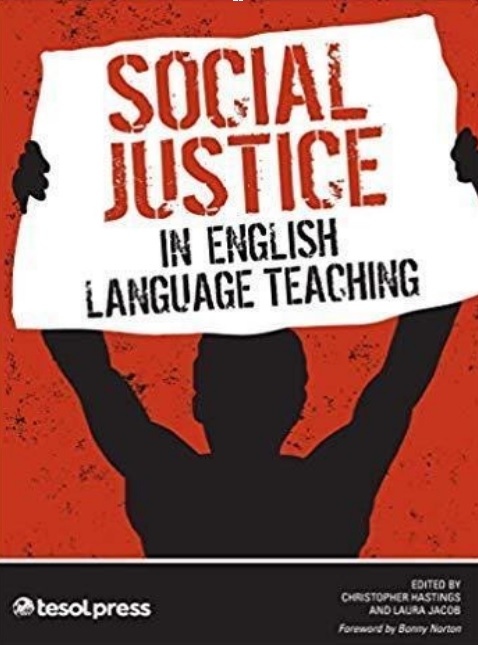
By Nancy Kwang Johnson and Kara Mac Donald
With the CATESOL Spring Virtual Conference just around the corner in early May with a focus on transformation, inclusion, diversity, and engagement, it seemed appropriate for the Diversity, Equity and Inclusion panel coordinator, Nancy Kwang Johnson, to be invited to contribute to featuring a publication on advocacy for diverse student population for a book review leading up to the Spring Virtual Conference. There are numerous books on social justice in the classroom, but the desire to highlight a book specifically addressing English Language Teaching was a principle criterion. Moreover, CATESOL Education Foundation Diversity, Equity and Inclusion grant recipients will be using the book in their workshops. Social Justice in English Language Teaching (ELT) (Hasting & Jacob, 2016) was selected as it closely aligns with membership needs and is also a TESOL Press publication. However, it is valuable to note that this publication was reviewed in the CATESOL Blog, Book Review column in April of 2020 by Kara Mac Donald with Kristen Arps. Some CATESOL Blog readers may recognize it. Nonetheless, it is featured again in light of the conference theme as it can provide valuable insight for those familiar with the book to revisit its content, as well as introducing a new resource for those who are not. In light of the conference focus, this review is more in depth than the prior one. Additionally, as is the structure of the books to some degree, where at the beginning of the book conceptual issues are presented and addressed regarding practice-based responses with a more applied focus later in the book, with case studies, curriculum approaches and instructional suggestions. The book review language and style of the chapter reviews reflects more in-depth conceptual reflection of the content early in the review and a more tangible practitioner language style towards the end.
Virtual Team Success, A Practical Guide for Working and Leading from a Distance, by D. M. DeRosa & R. Lepsinger
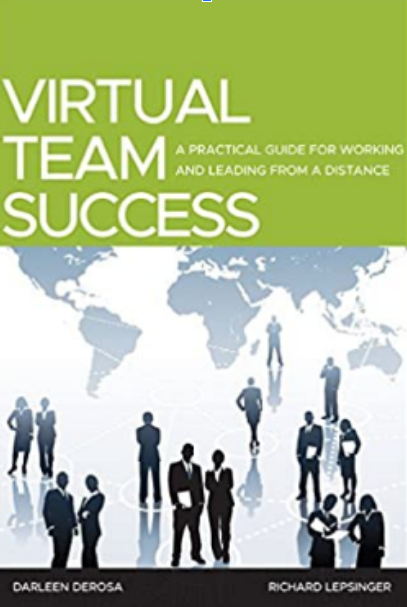
By Mirna Khater and Kara Mac Donald
Effective team interaction in the online environment has been a prominent topic in business and in education for more than a decade. However, with the mandatory mass move to online teaching by educators across the globe, many teachers who were not familiar with leading and/or interacting as a team in the virtual environment were forced to learn how to do so. The summer book review series addressed online teaching approaches, the fall series of short text reviews considered teachers’ needs in the online instructional environment, and the new year January book review continued with the online teaching focus. This February issue of the CATESOL’s Blog book review also emphasizes the online context, but shifts the focus from pedagogical and student-focused content to the leadership needs of teachers operating in the virtual environment.
Grit in the Classroom, Building Perseverance for Excellence in Today’s Students, Laila Y. Sanguras
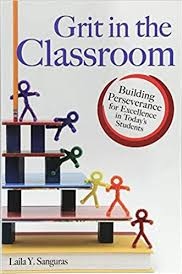
By Robb Hill and Kara Mac Donald
Grit in the Classroom in many ways builds on Duckworth’s 2016 Grit: The power of passion and perseverance, discussing how to develop an environment that fosters learners’ resiliency. The book isn’t new off the press, it was published in 2017 and doesn’t focus on the virtual learning environment. However, the book came to mind for the authors as teachers are wrapping up the schoolwork and going on a much needed break after delivering instruction online for the second semester. Teachers are again going to be having virtual instruction for the third time as classes resume in 2021. This short accessible text is an enjoyable reading with some ideas to further develop the resiliency teachers have built in their learners over the last year in the virtual environment, even if not specifically geared to this context. Resiliency and the factors that develop it are not context specific.
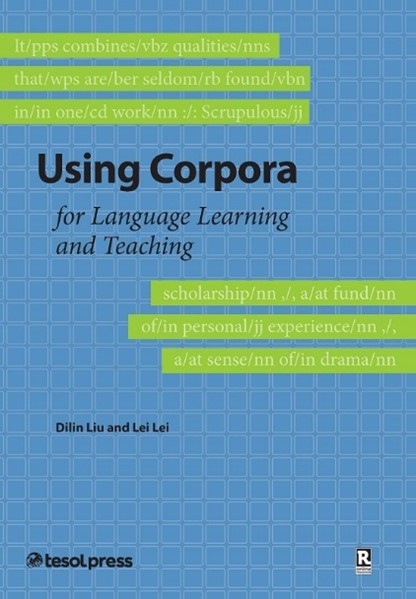 Using Corpora for Language Learning and Teaching, by Dilin Liu and Lei Lei
Using Corpora for Language Learning and Teaching, by Dilin Liu and Lei Lei
By Jose Franco and Kara Mac Donald
Corpus linguistics as a form of instruction is a relatively new field, due to this fact, many teachers may not be familiar with how to utilize corpora for classroom teaching (also known as data-driven learning). The authors provide an extremely accessible and practical discussion with examples for readers to understand corpus use processes and techniques. Chapters include ‘Think and Do’ activities that support the reader in applying the information read, which permit the reader to apply the content to his/her context and needs.
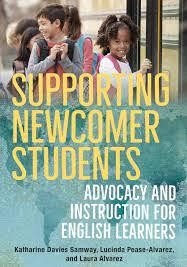 Supporting Newcomer Students, Advocacy and Instruction for English Learners
Supporting Newcomer Students, Advocacy and Instruction for English Learners
Lucinda Pease-Alvarez, Laura Alvarez, Katharine Davies Samway (2020), TESOL Press
By Yara Khamis & Kara Mac Donald
The authors come from distinct fields within education and utilize their extensive experience to define, embrace, connect with, and advocate for newcomer learners in the classroom and beyond. The text is highly accessible and relevant to novice as well as experience teachers working with newcomer students.
The introductory chapter helps to lay a foundational understanding for the rest of the book by defining the political, social, and economic contexts that newcomer students come into in the United States (U.S.) and more specifically schools. We learn about the newcomer experience once they arrive in the U.S, like the programs they are put into. This chapter also helps to outline the historical flow of immigrants into the U.S, the effect of current immigration policies, the difficulties faced along the journey and the effect it leaves on the students once arriving.
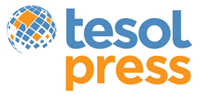 Classroom Interaction for Language Teachers by Steve Walsh & Language Cooperative Learning and Teaching by George M. Jacobs and Harumi Kimura
Classroom Interaction for Language Teachers by Steve Walsh & Language Cooperative Learning and Teaching by George M. Jacobs and Harumi Kimura
By Aylin Baris Atilgan Relyea and Kara Mac Donald
The CATESOL Blog Book Review column has provided reviews of short booklets from three development series out of the TESOL Press edited by Thomas S.C. Farrell or Andy Curtis for the CATESOL 2020 fall issues. Since teachers have been busy with the ongoing and continual changes of the online teaching environment during COVID19, the column has offered members with accessible short practice-based and pedagogical-oriented texts that are highly relevant to inform online instruction, provide support and accessible professional development to teachers in the current context. With the end of the fall semester approaching, this will be the last installment of this series. Indeed the semester continues through November and into part of December, but the intention of returning to traditional review of full-length texts in November is that members can read the conventional length book reviews in preparation for possibly selecting reading for professional development over the winter break.
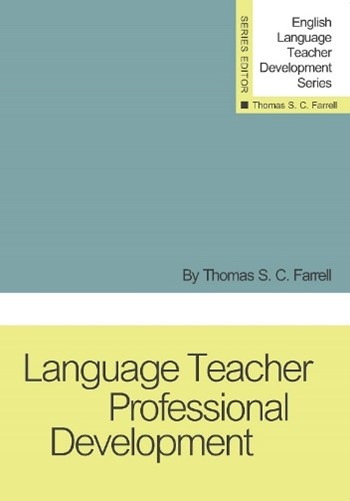 Language Teacher Professional Development, By Thomas S.C. Farrell (2015), Series Editor Thomas S. C. Farrell, TESOL Press
Language Teacher Professional Development, By Thomas S.C. Farrell (2015), Series Editor Thomas S. C. Farrell, TESOL Press
By Erin O’Reilly and Kara Mac Donald
In the Introduction, Chapter One, the author places teachers in three categories, with no value on the category one may self-assign or be assigned. He explicitly stated that each teacher, regardless of the category at any point in time, are doing what they understand best and the book is aimed at all educators across such categories, because he believes in teachers’ sincere intent.
Resiliency is a term that we associate with hardship, challenge or even trauma, while simultaneously symbolizing strength, adaptability or possibly a return to our core purpose. Within the context of our professional lives, resiliency allows us to continue to teach and support our students, adapt our classrooms and pedagogy and seek out opportunities for networking and engagement with publishers, exhibitors, and the content itself. The conference committee has come together under these circumstances and with great single-mindedness in an effort to support you and further deepen the professional resiliency in all of us.
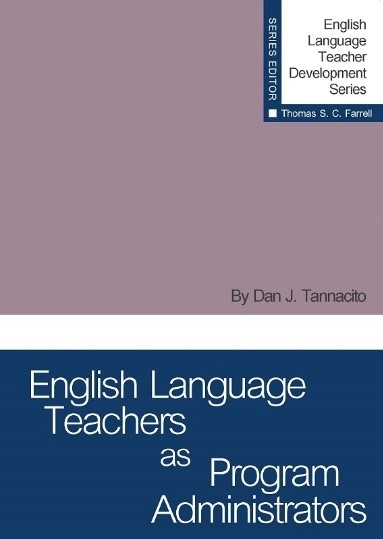 English Language Teachers as Program Administrators by Dan J. Tannacito & Language Teacher Professional Development by Thomas S.C. Farrell
English Language Teachers as Program Administrators by Dan J. Tannacito & Language Teacher Professional Development by Thomas S.C. Farrell
By Erin O’Reilly and Kara Mac Donald
An installment of the CATESOL 2020 FALL Book Review Sequence for Busy Teachers – Featuring TESOL Press ELT Development Series & English Language Teacher Development Series, Editor Thomas S.C. Farrell and ELT in Context Series, Editor Andy Curtis
Quick Recap to the 2020 Fall Book Review Sequence for Busy Teachers
The CATESOL Blog Book Review column is offering reviews of short booklets from three development series out of the TESOL Press edited by Thomas S.C. Farrell or Andy Curtis for the CATESOL 2020 fall issues. The goal is to provide members with accessible short practice-based and pedagogical-oriented texts that are highly relevant to inform online instruction, provide support and accessible professional development to teachers in the current COVID19 teaching environment.
 CATESOL Book Review: Project-Based Learning by Erin Knoche Lverick (2019), Series Editor Thomas S.C. Farrell, TESOL Press
CATESOL Book Review: Project-Based Learning by Erin Knoche Lverick (2019), Series Editor Thomas S.C. Farrell, TESOL Press
By Viktoriya Shevchenko and Kara Mac Donald
Challenge your students and create a collaborative classroom environment with project-based learning. Explore the benefits of using project-based learning with English language learners and learn techniques for every step of the lesson, from rubric design to assessments and reflection. Discover how to create an enriching teaching and learning experience for you and your students! - TESOL
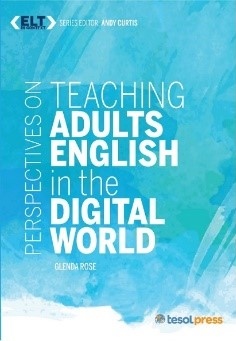 CATESOL Book Review: Teaching Adults in a Digital World by Glenda Rose (2016), Series Editor Andy Curtis, TESOL Press
CATESOL Book Review: Teaching Adults in a Digital World by Glenda Rose (2016), Series Editor Andy Curtis, TESOL Press
By Viktoriya Shevchenko and Kara Mac Donald
The Introduction frames the context of online learning as unique to many language learning settings, as students are often in class spread across many countries and highlights the importance of the diverse factors in online teaching. The format of the book, distinct from other books in the series, is described based on the nature of online learning as not constrained by a particular context.
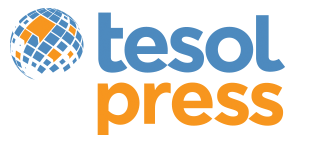 CATESOL 2020 FALL Book Review Sequence for Busy Teachers - Featuring TESOL Press ELT Development Series & English Language Teacher Development Series, Editor Thomas S.C. Farrell and ELT in Context Series, Editor Andy Curtis
CATESOL 2020 FALL Book Review Sequence for Busy Teachers - Featuring TESOL Press ELT Development Series & English Language Teacher Development Series, Editor Thomas S.C. Farrell and ELT in Context Series, Editor Andy Curtis
By Viktoriya Shevchenko and Kara Mac Donald
Overview to 2020 Fall Book Review Sequence for Busy Teachers
With the swift transition to online teaching, many instructors were not only figuring out how to navigate the online delivery platform, but also how to apply language acquisition and pedagogical principles to online lesson delivery on the fly.
With face-to-face (f2f), as well as some hybrid and online, educators grappling with the hasty switch, the reality is teachers may likely have little time to invest in reading full length professional development books, even though of interest, in the current constantly changing educational and social contexts.
Consequently, the CATESOL Blog Book Review column will offer reviews of short booklets from three development series out of the TESOL Press edited by Thomas S.C. Farrell or Andy Curtis for the CATESOL 2020 fall issues (August to November). The goal is to provide members with accessible short practice-based and pedagogical-oriented texts that are mighty1 and highly relevant to inform online instruction, provide support and accessible professional development to teachers.
Book Reviews from the ELT Series
The books were selected, among many in the ELT series, with the COVID19 online context in mind. The first text addresses a seemingly lesser focus of discussion on teaching adults online, as the K-12 context has somewhat prominent. The second text responds to the enormous screen fatigue experienced by students, regardless of educational context, who can benefit from the organization of off-screen in-class activities through project-based learning while being held accountable through communicative final products.
CATESOL 2020 State Conference: Join the Conversation by Margi Wald and Amy Pascucci
Resiliency. This is the theme of the CATESOL 2020 State Conference. If you’re new to CATESOL, our state conference is an annual event where educators from up and down the state and beyond come together in one place for four days to learn, collaborate, and enjoy the company of passionate colleagues. Knowing this, you can imagine why we decided to center this year’s conference around resiliency. We, the conference organizers, hope that this year more than any other year in CATESOL’s recent past, conference attendees walk away from the four days with renewed passion and resolve, and sharpen their skills so that they may continue to show up for their students and colleagues amidst the many obstacles that we currently face.
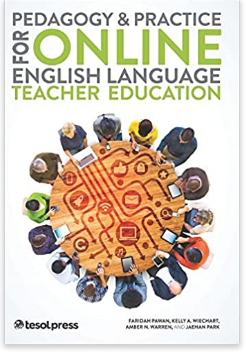 CATESOL Book Review: Pedagogy & Practice for Online English Language Teacher Education
CATESOL Book Review: Pedagogy & Practice for Online English Language Teacher Education
By Kara Mac Donald and Suzanne Bardasz
Pre-service and In-service teacher education in increasingly being offered and accessed online. It may be the delivery of training and professional development for teachers, and informs their delivery of language instruction to students virtually. Therefore, pedagogy needs to be the underlying source for development, design and delivery, not technology. The authors share principles and examples the how to accomplish this.
Online ESL Instruction in the Time of COVID
By Liza E. Martinez
Spring 2020 began as any semester. On our first week back, teachers came to campus to prepare for the upcoming semester; this culminated with the Faculty start-up meeting. The next two months progressed as usual. During that time, we heard of COVID-19 increasing and spreading, but we were not alarmed. It was still far away and not a part of our daily lives. Everything changed during the week of March 9. We heard that ASU, our sister institution, would be abandoning face-to-face classes and switching to online instruction. “We need to get ready,” advised Dr. Susan Salminen, a fellow ESL professor. “Since we share two classes, I can get them Zoom accounts,” she continued. I meekly agreed hoping it would not come to this.
Advocating for English Learners: Are You Ready to Take Action for Learners, Their Teachers, and Their Programs!
By Judith B. O’Loughlin, CATESOL Advocacy and Policy Advisor (joeslteach@aol.com)
From June 22-24 I attended the 2020 TESOL Annual Advocacy and Policy Summit representing CATESOL. This year the Summit was delivered virtually for advocates from all over the U.S. and internationally representing TESOL Affiliates. Days one and two were dedicated to providing attendees with updated information about what was happening related to upcoming legislation about English learners, their programs, and their teachers. There were speakers from 9 AM – 5 PM PT. Much of the first day was devoted to understanding what is happening for K-12 programs and the second day focused on the adult learner both nationally and internationally.
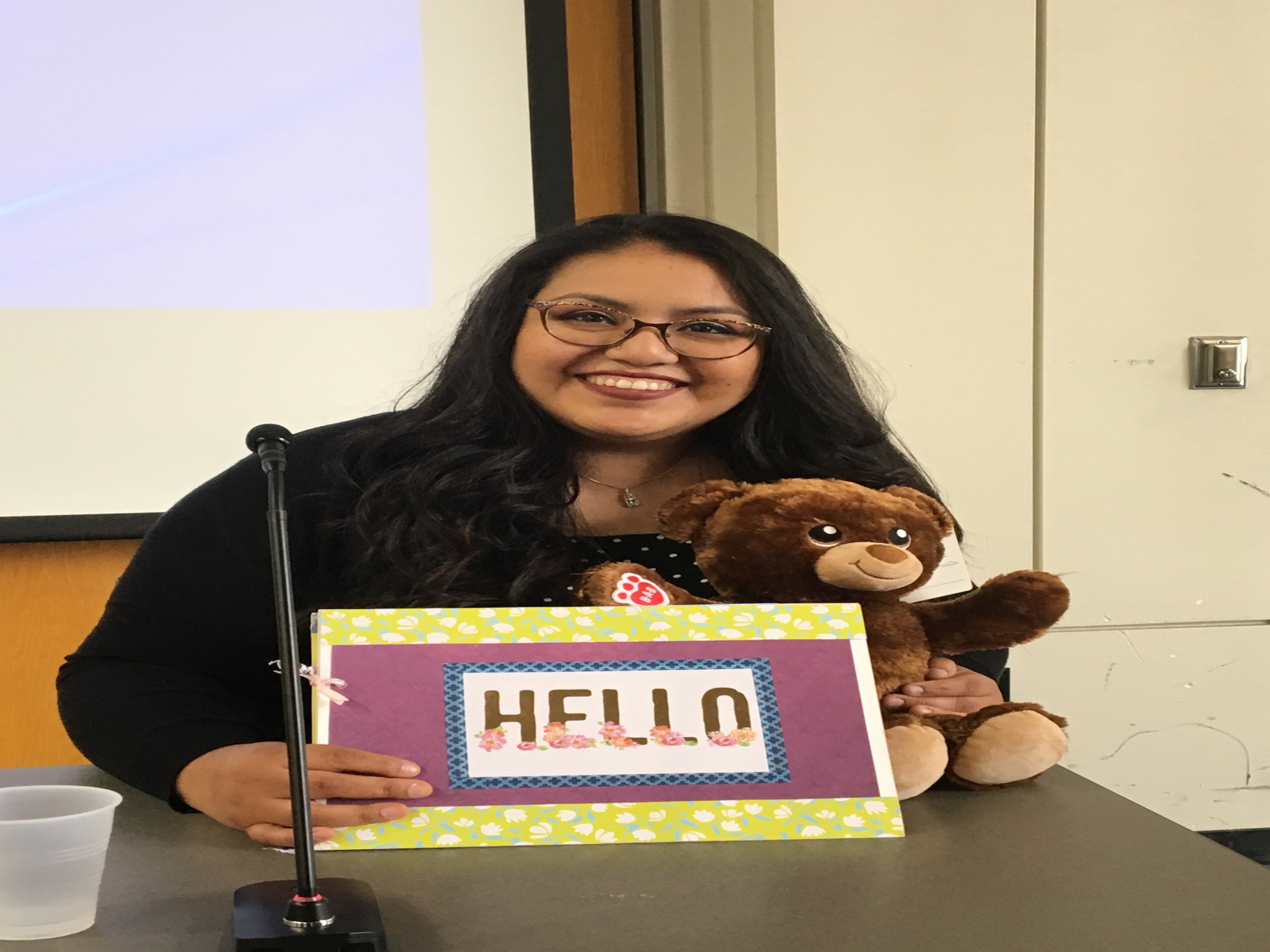 Steinbeck Chapter: Looking Towards the Future
Steinbeck Chapter: Looking Towards the Future
By Amber Paluszynski and Ondine Gage // Originally published in July 2019
As we come to the end of the second decade of the 21st century, the landscape for TESOL professionals has changed dramatically. From a burgeoning profession in the 1980s, we now find fewer and fewer viable graduate programs. Since 9/11, the intensive English industry has largely moved to other countries. As many of us have repurposed our TESOL training, the situation has led us to consider what unique skills do TESOL professionals provide to other areas of society? In response, the Steinbeck Chapter has shifted our focus to providing professional development which considers the ways in which we bring our unique set of TESOL knowledge, skills, and attitudes to a variety of social contexts. For our spring 2019 event, we offered a presentation and panel titled, “Education and Social Justice; The Role of Civic Engagement, Service Learning and Interculturality."
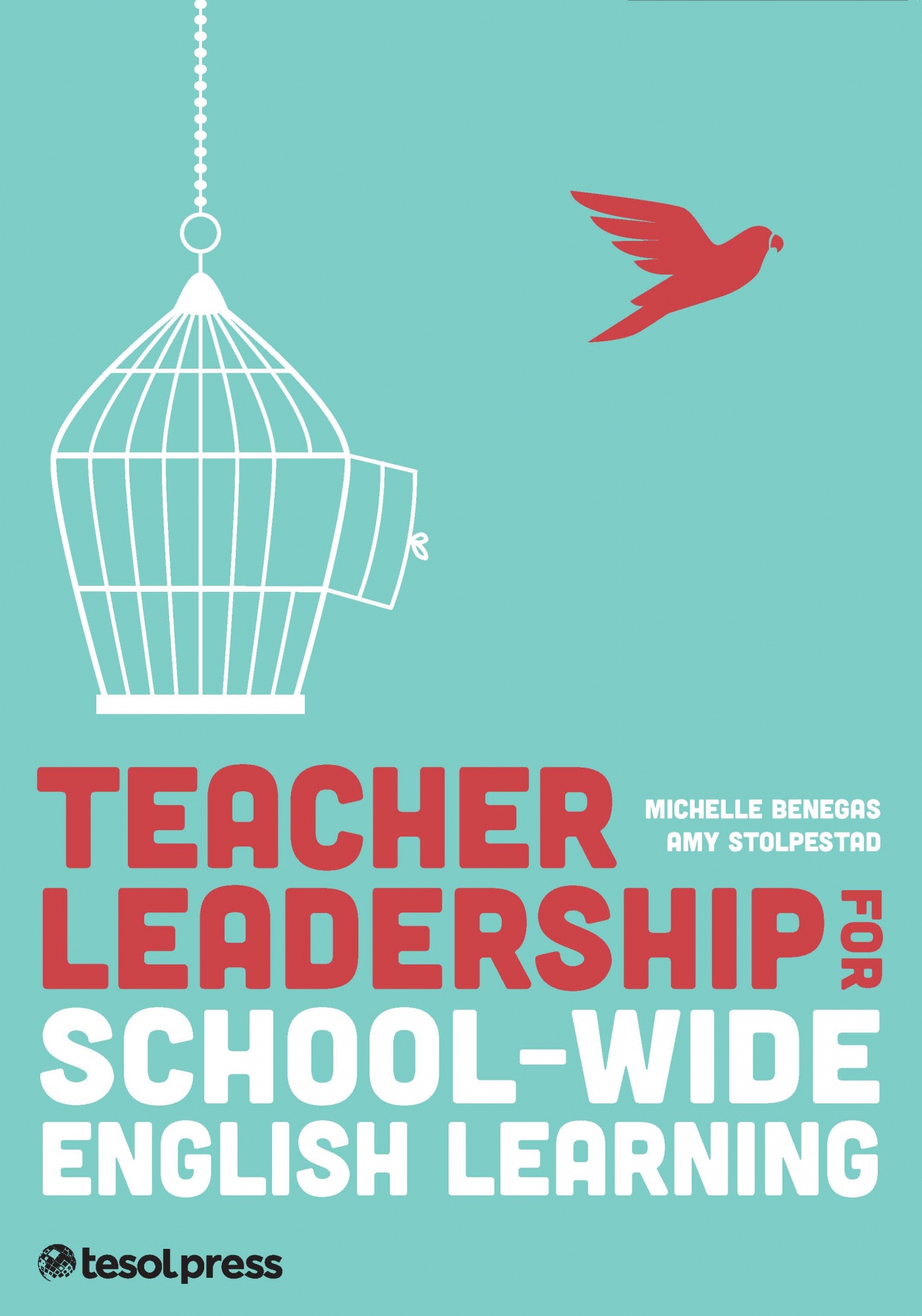 Teacher-Leadership for School-Wide English Learning
Teacher-Leadership for School-Wide English Learning
By Kara Mac Donald and Sonia Estima
The importance of language for survival regardless of the context is raised at the beginning of the Introduction with an example among animal species. This is linked to the importance of English Learners (ELs) having the appropriate language skills to participate in the English-speaking communities in which they live. However, the concern is raised that ELs spend much of their instructional day with teachers that are not trained in working with learners of English. The argument presented is that educators in ESL need to be trained to not only teach ELs language, but also serve a guides and mentors of general subject matter content teachers. The Introduction moves the discussion of how investment in one U.S. state EL legislation (i.e. English Learners in the Mainstream [ELM]) relevant to the author/s, then developed into a school-wide English learning (SWEL) model that offers guidance for teacher leading other educators.
Moving Online: Challenges and Lessons Learned by Lily Lewis and Nairi Issagholian
As two ESL instructors teaching adults in a university Intensive English Program (IEP), we decided to conduct timely action research early on in this transition process. We collected data by keeping a teaching journal, recording all online courses we taught, comparing course syllabi/learning outcomes with actual instruction that took place online, and gathering informal input from our students regarding their perspectives on online instructional practices. Next, we analyzed the data to identify patterns of obstacles we faced and specific ways we overcame them. In the following sections, we will share the challenges we encountered and the practical strategies we found useful in five relevant areas: technology, students, teachers, program
requirements and support, and pedagogy.
 TESOL Statement on Racial Injustice and Inequality
TESOL Statement on Racial Injustice and Inequality
"Alexandria, VA – (1 June 2020) Over the last week, we at TESOL International Association have joined with the rest of the world in our feelings of sadness, disgust, and anger at the senseless killing of George Floyd. With this most recent incident of police brutality involving a person of color in the United States, it seems undeniable that while the fear and pain caused by one epidemic has upended our lives, another equally menacing epidemic of racism continues to tear apart our communities and threaten the ideals of freedom, peace, and prosperity to which we so tirelessly aspire." // FULL STATEMENT
 US Department of Education - English Services to English Learners
US Department of Education - English Services to English Learners
"This fact sheet outlines States’ responsibilities to English learners (ELs) and their parents1 during the extended school closures and, in some cases, the move to remote learning2 due to the national emergency caused by the novel Coronavirus disease 2019 (COVID-19)."
US DOE - FACT SHEET // MAY 2020
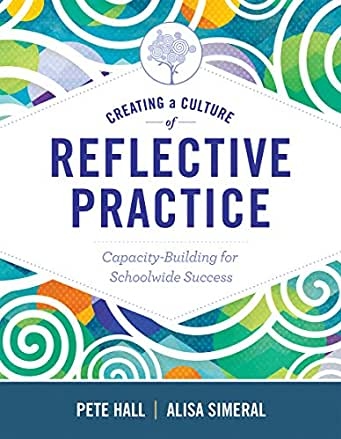 By Kara Mac Donald and Hanan Khaled
By Kara Mac Donald and Hanan Khaled
The book is divided into three sections, Part I: The Game, Part II: The Players and the Playing Field and Part III: The Playbook, with four to five chapters in each part. From the get-go, the tone is so accessible and friendly as if the authors were chatting with you in a lecture hall, across a table in a faculty meeting or in the campus or school cafeteria. This is one essential component of the whole text.
 by Kara Mac Donald and Jose Franco
by Kara Mac Donald and Jose FrancoStatistics for Linguists: An Introduction Using R (2020) by Bono Winter takes a unique approach towards introducing statistics of linear models for linguistics, in that it builds model-based thinking instead of test-based thinking. Winters explains that he takes this approach to basic linear modeling as it provides the researcher a foundation of theoretical understanding of the statistical model they choose to use. He also describes why he structured the book around R, opposed to utilizing SPSS. The text do not concentrate on mathematics, but aims to provide the researcher with practical and relevant information using extremely accessible language.
Tips for Teaching Online with Margi Wald
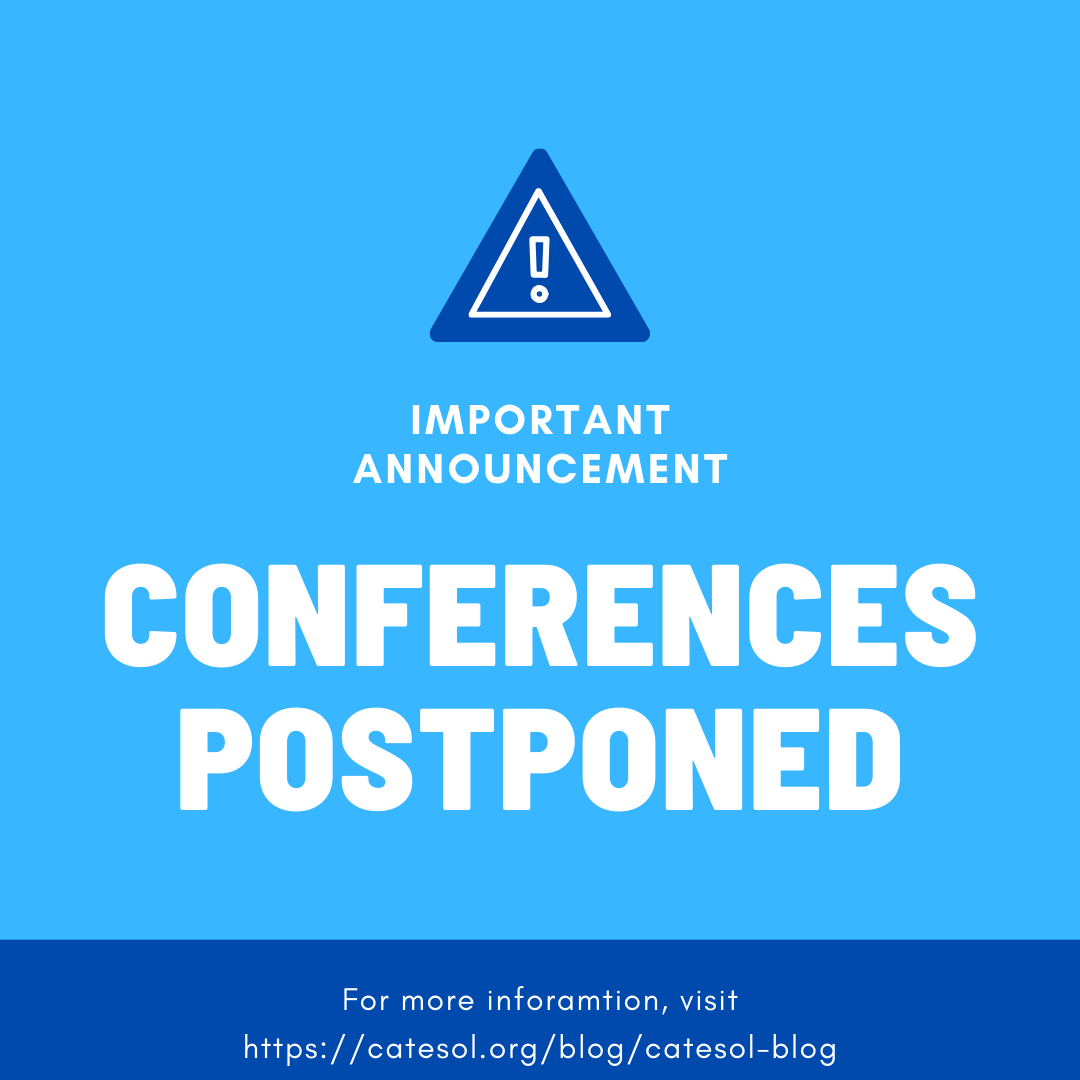
CATESOL to Postpone Upcoming Conferences Due to COVID-19
As you know, we are facing a pandemic with COVID-19. In line with the actions of TESOL and other organizations to postpone or cancel large gatherings to reduce risk of virus transmission, the CATESOL Board voted today to postpone all Chapter and Regional face-to-face events until the fall of 2020. We feel that the safety of our membership far outweighs the risk of a face-to-face gathering. We are still planning on having our Annual Conference in October of 2020, provided this crisis is contained by then.
Since many classes are moving to an on-line format, at least temporarily, CATESOL wants to help teachers who don’t feel ready. We are planning two online events in April and May, starting with workshops on how to teach with Zoom and other online platforms. We will get back to you with details on this very soon. We will be updating our website to reflect the physical event postponement and the upcoming online teaching support as soon as possible.
We thank you for your consideration as we do what we can to continue professional development for teachers in non-face-to-face formats. Stay healthy, everyone. The board will be meeting on March 23rd to decide on how to handle the finances of this postponement.

Book Review: Wordless Books: So Much to Say (2015)
By Kara Mac Donald featuring Erin O'Reilly
The book is divided into two sections, Stories with Easy Pictures to Follow and Stories with More Complicated Pictures to Follow. Each section is grouped on proficiency levels, with guidance on which skill/s development is targeted. In each section are lesson plan descriptions, assessment guidance and rubrics, additional resources and which TESOL PreK-12 English Language Proficiency Standards and Common Core State Standards ELA Suggested Connections are met.
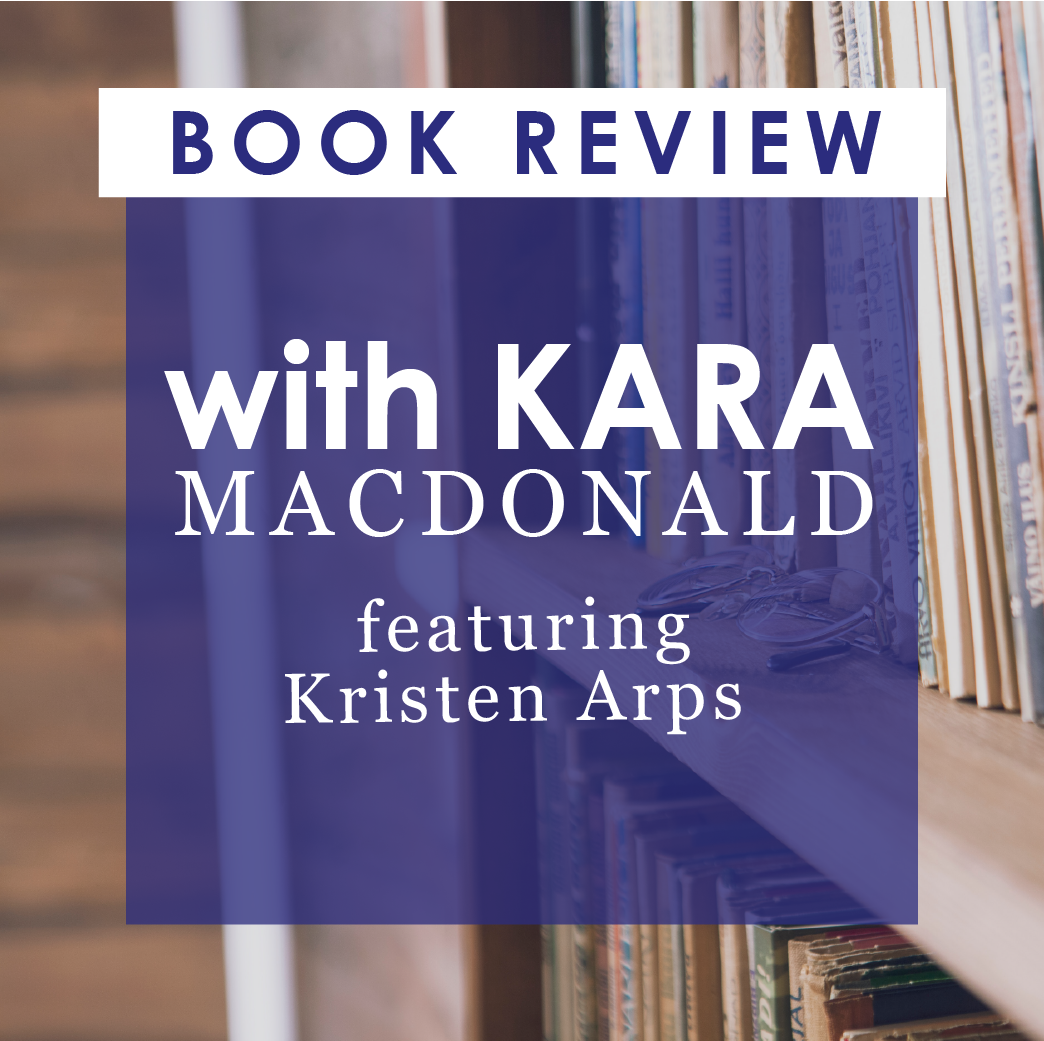 Social Justice in Language Teaching (2016) Book Review
Social Justice in Language Teaching (2016) Book Review
By Kara McDonald and Kristen Arps
Social Justice in Language Teaching, edited by Christopher Hastings and Laura Jacob consists of 22 chapters, divided into 7 sections that address specific topics around social justice in ELT. Part I: Social Justice and English Language Teaching: Setting the Stage, Part II: Peacebuilding and English Language Teaching, Part III: Positioning for Advocacy, Part IV: Language Rights, Privilege, and Race, Part V: Gender and Sexual Orientation Justice, Part VI: Working Across Borders/Advocating for Students. Part VII: Classroom Practices.
 What do Members of CATESOL TOP-IG Want from their Interest Group?
What do Members of CATESOL TOP-IG Want from their Interest Group?
By Marsha Chan and Jaydene Elvin
In Spring 2019, 2018-19 TOP Co-coordinators Marsha Chan and Ellen Lange, along with Assistant Coordinator Jaydene Elvin, polled the Teaching of Pronunciation Interest Group. An online Google survey was announced via (the now-defunct) TOP-IG Google Groups, and TOP members were encouraged to participate. The survey was designed to gather information regarding how members would like to engage in TOP-IG platforms.
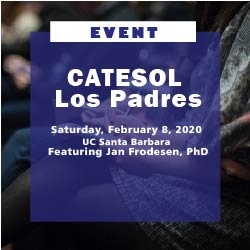
CATESOL Los Padres Chapter Event - February 8, 2020
The CATESOL Los Padres Chapter invites you to join them this weekend at UC Santa Barbara for their annual spring conference.
 By Kara Mac Donald and Sun Young Park
By Kara Mac Donald and Sun Young ParkGet involved, meet new friends, and contribute to making this conference a memorable event.
“Volunteers do not necessarily have the time; they just have the heart.”
~Elizabeth Andrew (1882–1960) was the first woman organizer Labor Party in Wales.
Why Volunteer?
Volunteers...


Plans for CATESOL’s 50th Annual Conference, “Honoring the Past and Inspiring the Future,” are underway! The Annual Conference will take place from October 3 to 6 at the San Jose McEnery Convention Center. Please take a look at the CATESOL Annual Conference website for...

TESOL is currently recruiting application reviewers for the Ron Chang Lee Award. Sign up today!
About the Award: Sponsored by Ron Chang Lee, this award was created in 2018 to honor three TESOL members who have achieved excellence through the implementation of technology...
 by Kara Mac Donald and Federico Pomarici
by Kara Mac Donald and Federico PomariciStillwell begin Chapter 1 by describing the wealth of experience teachers often have as many began careers in other fields or have taken courses in other disciplines as part of their teaching degrees. He preps the reader for the coming chapters, written by a variety of...

“I actually made friends in this class,” Leeza Stavinkov said wistfully, waving her slender arms in the air for emphasis. “Like in my other classes we just kinda sit there but in this class we actually like talked to each other.”
I smiled at her. You know that famous l...
CATESOL's history! Check out a fabulous piece by past CATESOL President, Kathleen Flynn on the history of CATESOL.

One of the great features of CATESOL’s Annual Conference is the opportunity to connect with colleagues from across the state and plant the seeds for future projects to bloom. Such was the case this past December in Anaheim in a meeting between the CATESOL President-Ele...
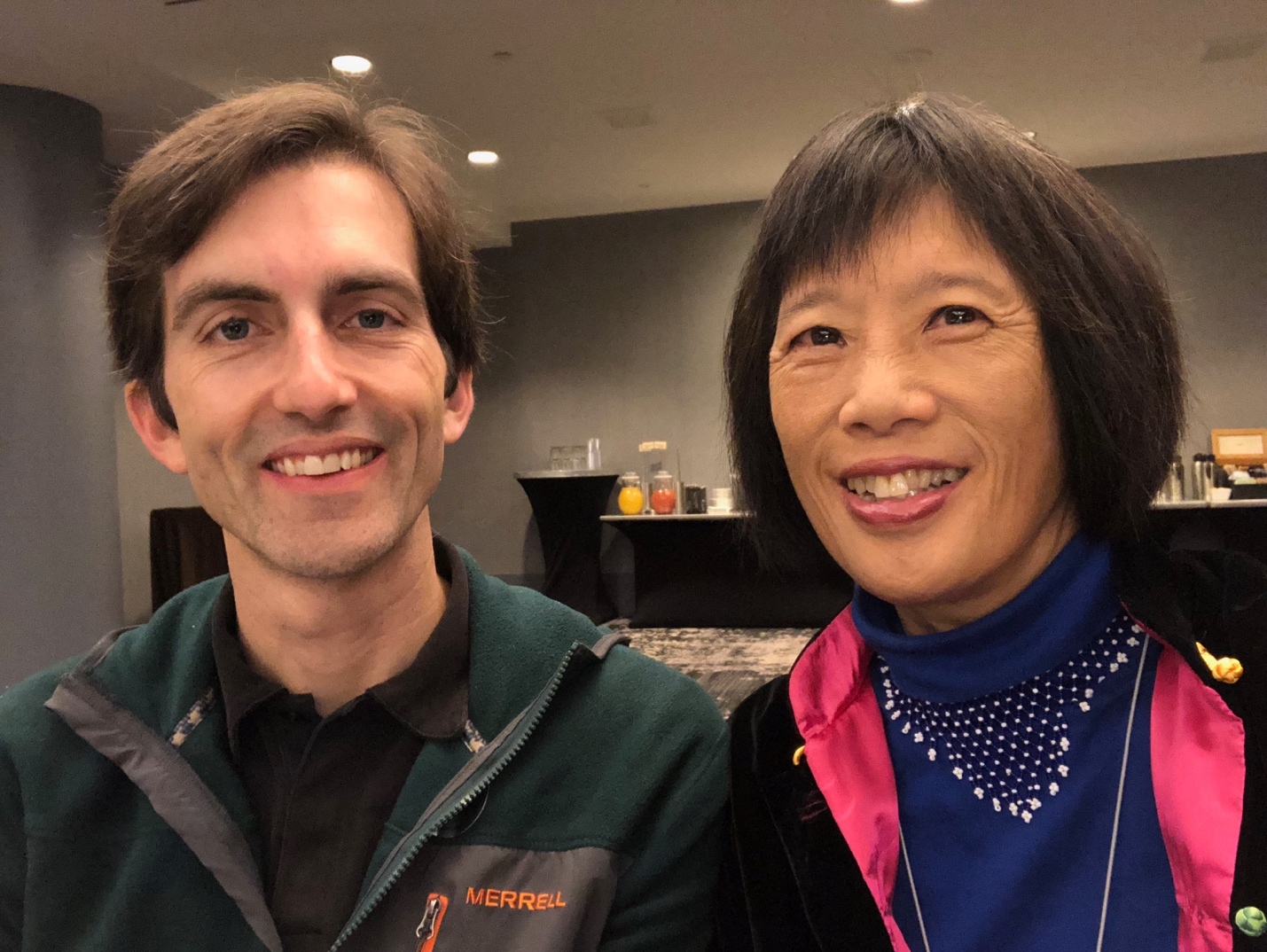
The Teaching of Pronunciation Interest Group (TOP-IG or TOP) is for teachers, tutors, and future teachers of all levels of experience teaching or researching pronunciation instruction, who teach or wish to teach students at any level to speak and understand oral English...

At this year's conference, I learned and appreciated many wonderful new ideas, teaching strategies, practical classroom activities, and cool tech tools. I am also grateful that CATESOL provided me the chance to promote my topic on gamification and game-based learning t...

I am a graduate student in TESOL program of Pepperdine University and I had the opportunity to attend the CATESOL 2018 Annual Conference. I am glad that I went because I learned a lot about language-teaching methods, designing activities that foster community in the cl...

Educators across California, and the United States (U.S.), often serve students that are recent arrivals as well immigrant students that have been long term residents in the U.S. and therefore, see the impact of these students’ immigration experiences and personal jour...

In October of 2017, AB 705 (Irwin) was chaptered into California state law and became effective on January 1, 2018. The historic law made changes to many things, but chiefly, it altered how colleges place students into English, mathematics, and academic English as a Se...

I came to America as an English language learner. When I was still a student in an ESL intensive program, I volunteered at a CATESOL conference. That was my first time at a CATESOL event and my very first memory of attending a professional conference.
I vividly rem...

As a person who loves English and strives for being an outstanding ESL instructor, I cherish this opportunity to attending this year's CATESOL conference--Oceans of Opportunity--and learning from other professionals in the TESOL arena.
I studied English as a second lang...
 CATESOL Position Statement in Response to proposed legislation AB 705 (Irwin)
CATESOL Position Statement in Response to proposed legislation AB 705 (Irwin) May 2017
The background: 2017 proposed California legislation AB 705 (Irwin) requires community college districts or colleges “to maximize the probability that [a] student will enter and co...
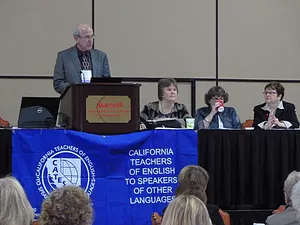 Are you looking for ways to make a difference professionally? Then become involved in the CATESOL Board of Directors! It is never too soon to consider joining the CATESOL Board of Directors, and it's easier than you think!
Are you looking for ways to make a difference professionally? Then become involved in the CATESOL Board of Directors! It is never too soon to consider joining the CATESOL Board of Directors, and it's easier than you think!  Authors: Bette Empol and Judith O’Loughlin were CATESOL Representatives at the 2015 TESOL Advocacy and Policy Summit, June 20-21, 2015.
Authors: Bette Empol and Judith O’Loughlin were CATESOL Representatives at the 2015 TESOL Advocacy and Policy Summit, June 20-21, 2015.We were asked to write a blog about our experiences. Part of this blog was featured on the TESOL website.
John Segota Asso...
 In this week’s Federal Flash, we cover U.S. Senator Patty Murray’s harsh words for the U.S. Department of Education on the Every Student Succeeds Act (ESSA), an update on congressional plans to rewrite the Higher Education Act, and the latest on President Trump’s nomin...
In this week’s Federal Flash, we cover U.S. Senator Patty Murray’s harsh words for the U.S. Department of Education on the Every Student Succeeds Act (ESSA), an update on congressional plans to rewrite the Higher Education Act, and the latest on President Trump’s nomin... There is a new Migrant Policy Institute commentary (see link below) which examines the characteristics of DREAMers and the similarly aged U.S. millennial population. The MPI report finds no evidence to support concerns about job competition between millennials and DRE...
There is a new Migrant Policy Institute commentary (see link below) which examines the characteristics of DREAMers and the similarly aged U.S. millennial population. The MPI report finds no evidence to support concerns about job competition between millennials and DRE... 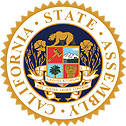 Safe Schools for Immigrant Students – AB 699
Safe Schools for Immigrant Students – AB 699The California Assembly has passed Assembly Bill 699 on October 5, 2017
The full wording of the bill can be found here:
http://leginfo.legislature.ca.gov/faces/billTextClient.xhtml?bill_id=201720180AB699
Key aspects of the bill...
 You might know me as your President-Elect. You might know me as the "tech guru". But you probably don't know the influence that CATESOL has had on my life. My first CATESOL conference was in 1978 in San Francisco. At that time I was a grad student at San Francisco Stat...
You might know me as your President-Elect. You might know me as the "tech guru". But you probably don't know the influence that CATESOL has had on my life. My first CATESOL conference was in 1978 in San Francisco. At that time I was a grad student at San Francisco Stat... Have you ever gone to a teaching conference and come home with inspiring ideas about revolutionizing your classroom? Have you actually done it? Most of us love great ideas, but find we don’t have the time or energy to reinvent how we teach once we come off our conferen...
Have you ever gone to a teaching conference and come home with inspiring ideas about revolutionizing your classroom? Have you actually done it? Most of us love great ideas, but find we don’t have the time or energy to reinvent how we teach once we come off our conferen... On March 29, 2018, Gwendolyn T. Schwabe, known to all as Tippy, passed away peacefully at the age of 91 in Haverford, Pennsylvania, where she had been living in retirement. The TESOL profession in California has much to thank her for, in her roles as a Senior Lecturer...
On March 29, 2018, Gwendolyn T. Schwabe, known to all as Tippy, passed away peacefully at the age of 91 in Haverford, Pennsylvania, where she had been living in retirement. The TESOL profession in California has much to thank her for, in her roles as a Senior Lecturer...This is the President's Quarterly Message
 The ESL industry is facing major disruptions, from shifts in international student mobility trends, to reductions in state budgets, to the rise of contract work. As educators in this ever-changing, competitive employment market, both novice and experienced CATESOL prof...
The ESL industry is facing major disruptions, from shifts in international student mobility trends, to reductions in state budgets, to the rise of contract work. As educators in this ever-changing, competitive employment market, both novice and experienced CATESOL prof...Pivot Point is a four-part series on 21st Century Employment Resiliency for ESL teachers marketing their skills beyond the classroom.
Have you ever thought of Becoming a Language Program Administrator (LPA)? At some point during your career, you may have witnessed a col...
 Pivot Point is a four-part series on 21st Century Employment Resiliency for ESL teachers marketing their skills beyond the classroom. This is the third post in the series on breaking into ESL publishing and commercial products and services marketing.
Pivot Point is a four-part series on 21st Century Employment Resiliency for ESL teachers marketing their skills beyond the classroom. This is the third post in the series on breaking into ESL publishing and commercial products and services marketing.Did you study commu...
 Pivot Point is a four-part series on 21st Century Employment Resiliency for ESL teachers marketing their skills beyond the classroom. This is the fourth post in the series on Exploring Overseas Teaching Opportunities. The ability to teach overseas may seem like a logist...
Pivot Point is a four-part series on 21st Century Employment Resiliency for ESL teachers marketing their skills beyond the classroom. This is the fourth post in the series on Exploring Overseas Teaching Opportunities. The ability to teach overseas may seem like a logist...  By Judith O’Loughlin, CATESOL Conference Services Advisor
By Judith O’Loughlin, CATESOL Conference Services AdvisorEach year the CATESOL Annual Conference is generally scheduled for October or November before Thanksgiving. Contracts with hotels and conference centers are planned up to three years in advance and dates are set...
 The following interview was part of a daylong Steinbeck Chapter of CATESOL event on Advocacy.
The following interview was part of a daylong Steinbeck Chapter of CATESOL event on Advocacy.As teachers, we are often moved by the stories of our students--especially our immigrant students. Many of us have participated in CATESOL because the organization’s mission has been to improve learning opportunities for our multilingual students. This interview of a pre-service teacher’s experience as a “Realistic Dreamer” explores the ways in which he navigated an educational system, which sometimes supported him but at other times created roadblocks. His story allows us to consider a student’s unique longitudinal perspective and to understand the challenges he faced at different junctures in life. For those of us who come from or have participated in immigrant communities, the story may be familiar. For those who serve students at any juncture within this journey, we hope that this story will provide a portrait of your students’ potential. As teachers, we have the power to expect the most in every student, and to see potential in students when they may not see it in themselves.
 The Loebner Prize Contest is the oldest Turing Test, which is named after Alan Turing, a famous English computer scientist who worked as a codebreaker in World War 2. This annual competition chooses the most human computer of the year. This year Ron Lee's chatbot "Tu...
The Loebner Prize Contest is the oldest Turing Test, which is named after Alan Turing, a famous English computer scientist who worked as a codebreaker in World War 2. This annual competition chooses the most human computer of the year. This year Ron Lee's chatbot "Tu...  AB 310 (Medina) – Community College Part-Time Faculty Office Hours
AB 310 (Medina) – Community College Part-Time Faculty Office HoursAB 310 (Medina) – Community College Part-Time Faculty Office Hours
This bill requires each community college district to report the total part time
 AFFILIATE REPORTS
AFFILIATE REPORTSWHAT'S HAPPENING INSIDE CATESOL?
Danielle Pelletier, President, CATESOL, USA
CATESOL has been working on several legislative initiatives to advocate for English language learners and educators, three of which are Assembly Bills 705 and 2098, and DACA.
